
Spring'f, 19:JB
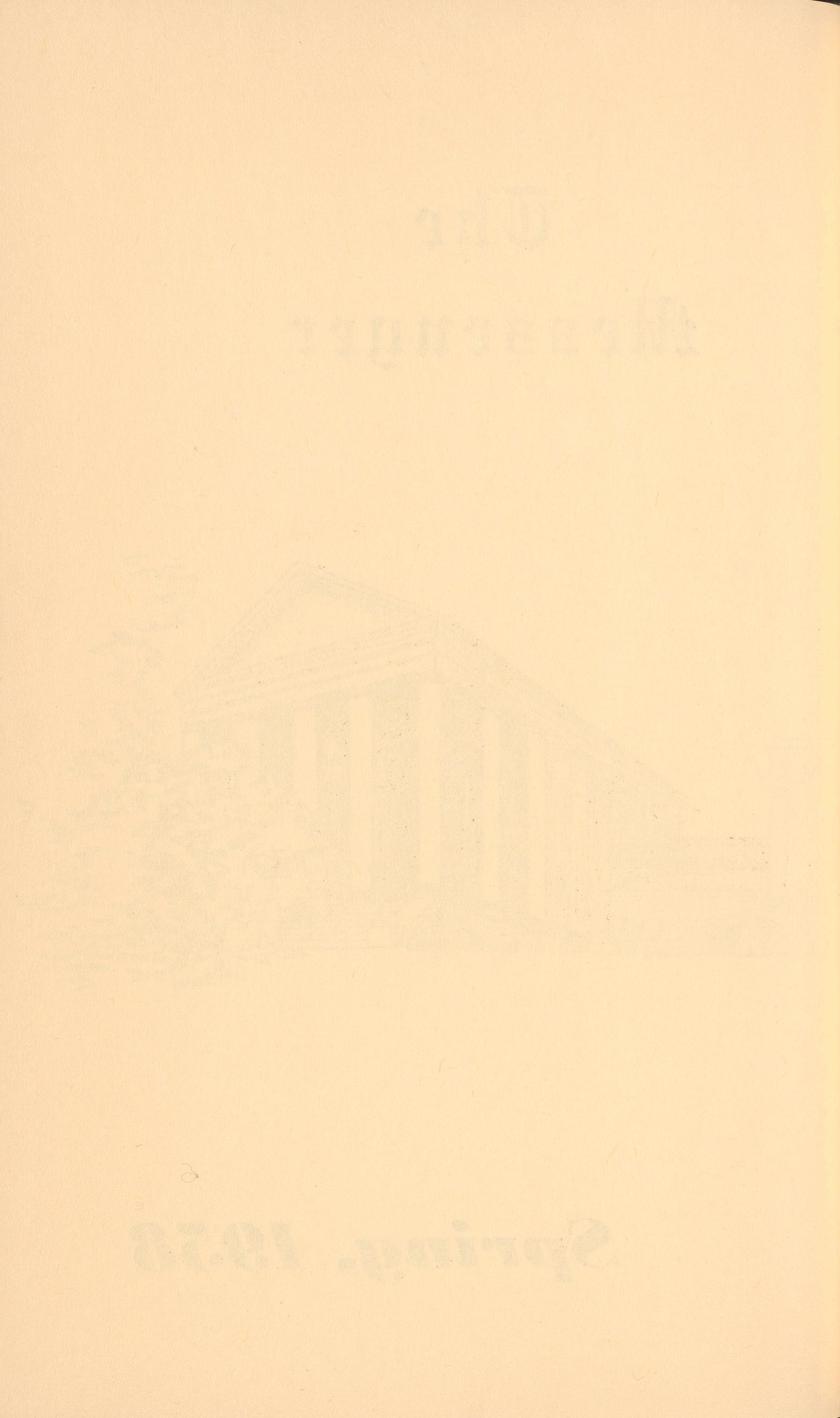


Spring'f, 19:JB

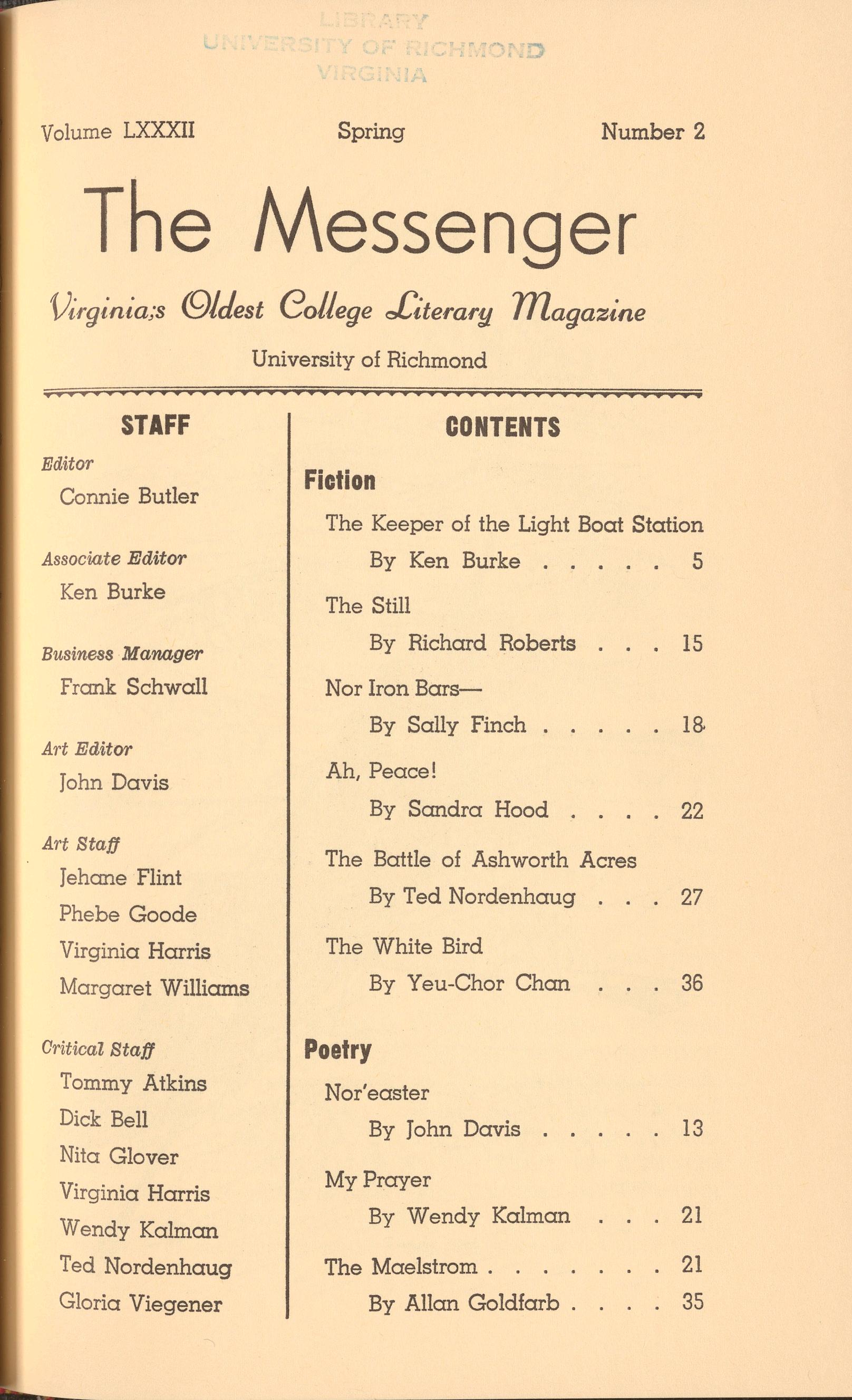
Editor Conn ie Butler
Associate Editor
Ken Burke
Business Manager
Frank Schwall
Art Edit or John Davis
Art Sta ff
Jehcme Flint
Phebe Goode
Virginia Harris
Marg aret Williams
Critical Staff
Tommy Atkins
Dick Bell
Nita Glover
Virginia Harris
Wendy Kalman
Ted Nordenhaug
Gloria Viegener

By KEN BURKE '58
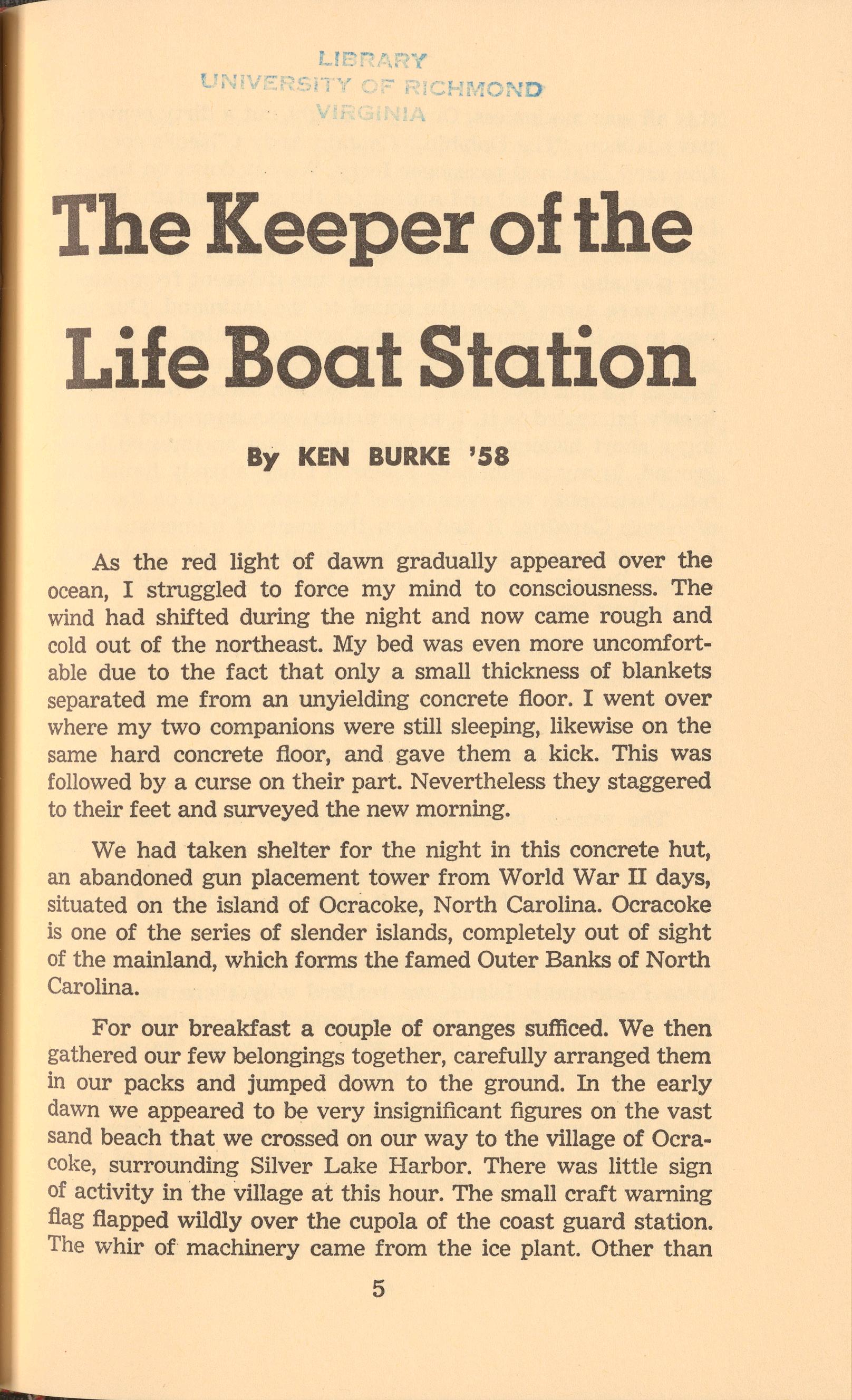
As the red light of dawn gradually appeared over the ocean, I struggled to force my mind to consciousness. The wind had shifted during the night and now came rough and cold out of the northeast. My bed was even more uncomf ortable due to the fact that only a small thickness of blankets separated me from an unyielding concrete floor . I went over where my two companions were still sleeping, likewise on the same hard concrete floor, and gave them a kick. This was followed by a curse on their part. Nevertheless they staggered to th eir feet and surveyed the new morning.
We had taken shelter for the night in this concrete hut, an abandoned gun placement tower from World War II days, situated on the island of Ocracoke, North Carolina. Ocracoke is one of the series of slender islands, completely out of sight of th e mainland, which forms the famed Outer Banks of North Carolina.
For our breakfast a couple of oranges sufficed. We then gath ered our few belongings together, carefully arranged them in our packs and jumped down to the ground. In the early dawn we appeared to be very insignificant figures on the vast sand beach that we crossed on our way to the village of Ocracoke, surrounding Silver Lake Harbor . There was little sign of a ctivity in the village at this hour. The small craft warning flag flapped wildly over the cupola of the coast guard station. The whir of machinery came from the ice plant. Other than 5
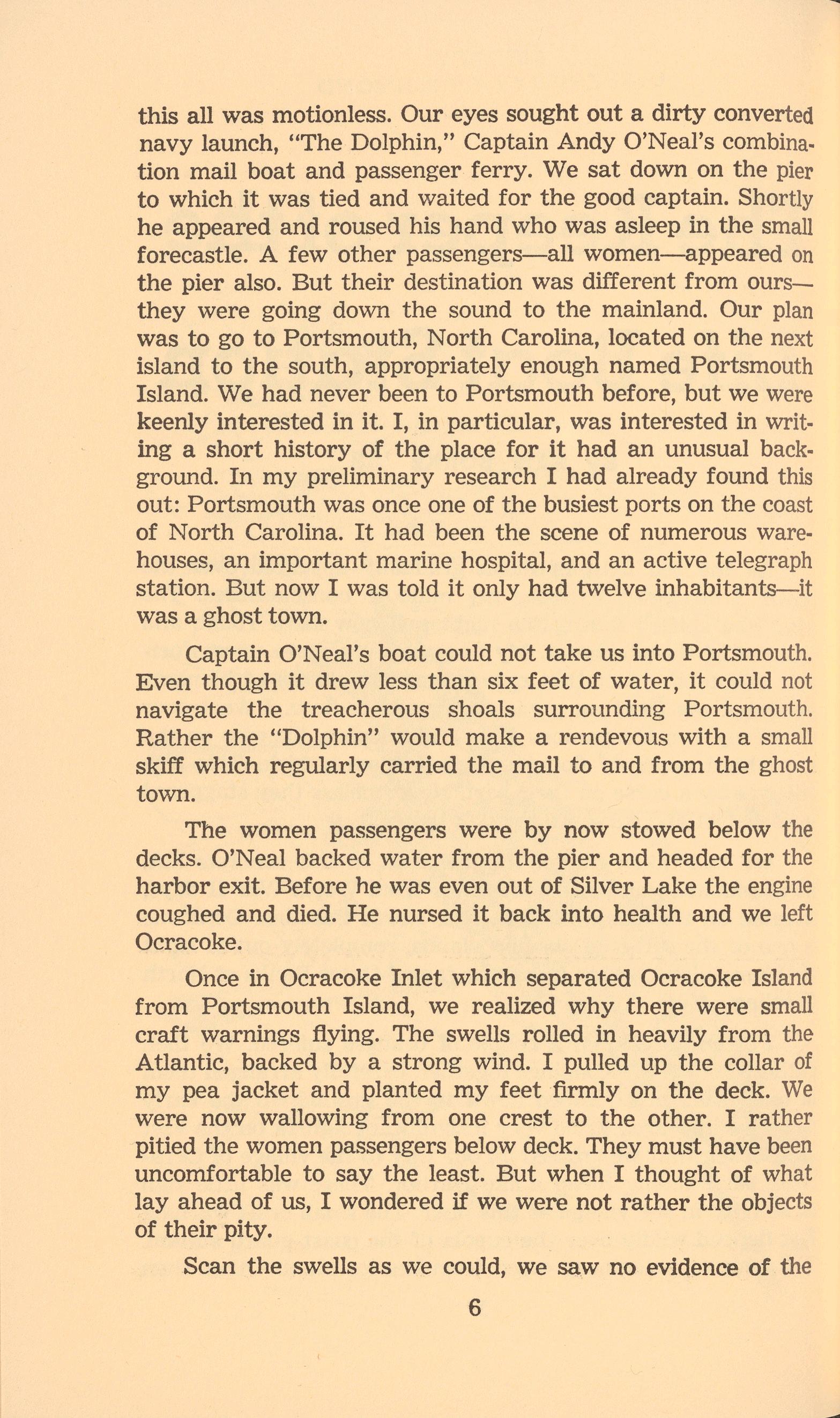
this all was motionless. Our eyes sought out a dirty converted navy launch, "The Dolphin," Captain Andy O'Neal's combination mail boat and passenger ferry. We sat down on the pier to which it was tied and waited for the good captain. Shortly he appeared and roused his hand who was asleep in the small forecastle. A few other passengers-all women-appeared on the pier also. But their destination was different from oursthey were going down the sound to the mainland. Our plan was to go to Portsmouth, North Carolina, located on the next island to the south, appropriately enough named Portsmouth Island. We had never been to Portsmouth before, but we were keenly interested in it. I, in particular, was interested in writing a short history of the place for it had an unusual background. In my preliminary research I had already found this out: Portsmouth was once one of the busiest ports on the coast of North Carolina. It had been the scene of numerous warehouses, an important marine hospital, and an active telegraph station. But now I was told it only had twelve inhabitants-it was a ghost town.
Captain O'Neal's boat could not take us into Portsmouth. Even though it drew less than six feet of water, it could not navigate the treacherous shoals surrounding Portsmouth. Rather the "Dolphin" would make a rendevous with a small skiff which regularly carried the mail to and from the ghost town.
The women passengers were by now stowed below the decks. O'Neal backed water from the pier and headed for the harbor exit. Before he was even out of Silver Lake the engine coughed and died. He nursed it back into health and we left Ocracoke.
Once in Ocracoke Inlet which separated Ocracoke Island from Portsmouth Island, we realized why there were small craft warnings flying. The swells rolled in heavily from the Atlantic, backed by a strong wind. I pulled up the collar of my pea jacket and planted my feet firmly on the deck. We were now wallowing from one crest to the other. I rather pitied the women passengers below deck. They must have been uncomfortable to say the least. But when I thought of what lay ahead of us, I wondered if we were not rather the objects of their pity.
Scan the swells as we could, we saw no evidence of the

skiff to which we were to transfer. But then O'Neal's hand cazne aft with a grin on his face. "There she is," he said. Seated in a fifteen foot skiff with an inboard motor was an old man protected with an oil slicker and a sou'wester. "I got some passengers for you, Tom," hollered O'Neal when we hove to. Tom Bragg didn't say anything, but his attitude was not unfr iendly, it was more of surprise. I don't remember now who it was, but one of us took the initiative, climbed over the rail, hung poised over the waves, waited for the right second, and jumped down into the bottom of Tom Bragg's boat. We passed our baggage down, and then we followed over the rail. The launch pulled away and left us adrift. Old Tom Bragg leaned over the motor and pulled the cord once. It failed to catc h . He jerked again and we had power. He moved to the stern and grasped the tiller. Meanwhile salt spray and water had been flying in the skiff, and we were quickly soaked. Tom awkwardly bailed with one hand and steered with the other. At my suggestion he gave me the scoop and I took over the bailing.
We soon came to more sheltered water and I had a chance to contemplate the horizon of Portsmouth. It was hard for me to believe that this was a ghost town. A newly painted church steeple was the focal point . But the cupola of the old coast guard station also commanded attention. Even these, however , did not give the aspect of life as much as did the roofs of the many houses seen at a distance.
When we touched the little pier, a couple of old men were stan ding there to greet us. We exchanged cordialities, but they left to us to explore the town. We left them down by the pier and followed a marshy path until we came to the first house. It was inhabited, but not too strongly. A few chickens wandered around inside a fence. We saw no human but we had the feeling we were being watched. We continued along the pat h which was too narrow to admit a car, had there been one on the island, which there was not . Each edge of the path sloped down to a marshy, black stagnant pool. Most of the ground was spongy and oozed at every step.
We then saw the true trademarks of a ghost town. Ahead of us were dilapidated houses, with roofs caving in, paintless and exposed to the weather. These were the remnants of the once thriving sea port. But they were few compared to the 7

number that once must have been there. Their companions had been torn down by man and destroyed by hurricane.
Only three houses which we passed were inhabited. But soon the turtleback path which we followed left even these behind. Without discussing where we were headed, we all gravitated toward one place, the old coast guard station. All our minds thought the same thing-here we could find shelter, here there would be a luxury of room, and here that might be we knew not what.
The coast guard station was a full two stories high plus a high pitched attic. Atop the roof was a lookout tower in the form of a cupola. The building was coated with brown cyprus shingles and was topped by a roof of the same material.
Like wolves circling an exhausted and weary deer, we stalked slowly around the building, trying a door here, a window there. We even gazed at the second story windows and contemplated the possibilities of gaining entrance through them. But then a lower window gave way to our pressure, and we scrambled in. The building had been used as a hunting club in times past. The lower floor consisted of a card room, a lounging room, a shower room, and a kitchen. Dust lay heavily everywhere. We mounted the steps to the second floor. This was filled by two large dormitory rooms. The beds with mattresses were still there. The sight of so many comfortable beds made this place seem a virtual paradise in contrast with our previous abode on a hard concrete floor.
A rat suddenly scurried across the floor. It was then we realized the place was infested with large pack rats. Paper nests were in the corner of the long unused oil heater. Bits of the mattresses were chewed up. We realized the station was not ours alone. But the rats to us were a small thorn on the stem of this, a rose.
Downstairs we cooked our lunch with our Sterno burner . Here we had ample water from the cistern for our cooking . Satisfied with a full stomach, my companions went upstairs to sack out. Unused to the luxury of a choice, they went about poking the dozen mattrasses to find the most comfortable. Before dozing off I told them I was going to walk about the island. l would whistle when I came back to let them know I was returning.
Downstairs, I raised the window and jumped out to the 8

ground. The wind had in the meantime risen somewhat. I started on the path through the marsh towards the little village. Once more the broken down shacks gave me a depressed feeling. I could see no human being anywhere. But there was one sign of life-an American flag flapped over a crude flagpole near an unpainted shack. I had never expected to see that here. The long arm of Uncle Sam touched even this lonely desolate island. The flag was flying, according to U. S. government regulations, over the small fourth class post office.
The building was locked (solely because of U. S. government regulations) so I sat down on the sagging steps and waited. A half-hour later a slim woman in her early forties came and opened the building. She nodded friendlily. I followed her inside. The interior had served as a store long ago. Still extant were the glass cases and wooden shelves. I bought several two-penny post cards and slowly began to write a few messages. I had not finished when a couple of old timers walked in. They were curious to see the stranger who had been so bold as to venture on their island. In the conversation that ensued they demonstrated fully that reserved friendliness which is so characteristic of the inhabitants of the Outer Banks. Their speech was marked by an accent not dissimilar from that of the Elizabethan Era. To my question about the history of Portsmouth, one reminisced about his bygone days.
"My grandmother," said Jody Styron, a man who carried well his eighty-four years, "told me that she looked out of window one morning and counted one hundred-fifty sail in Portsmouth harbor." He went on to tell about the marine hospital that mysteriously burned down while the coast guard station was being built in 1893.
When I left the post office, it was late afternoon. The wind had not abated, but rather if anything it was still higher. I walked back to the station deep in thought. The strangeness of this place fascinated me. At the station I raised the window and whistled. There was no answer. I whistled again but still no reply. I cautiously made by way upstairs. Entering the bunk doom, I saw my fellow adventurers still fast asleep. "Idiots," I thought. "I could be Black beard and they wouldn't wake up."
But I did not awaken them. Instead I climber to the lookout tower and gazed at the panorama before me.-To the south, 9
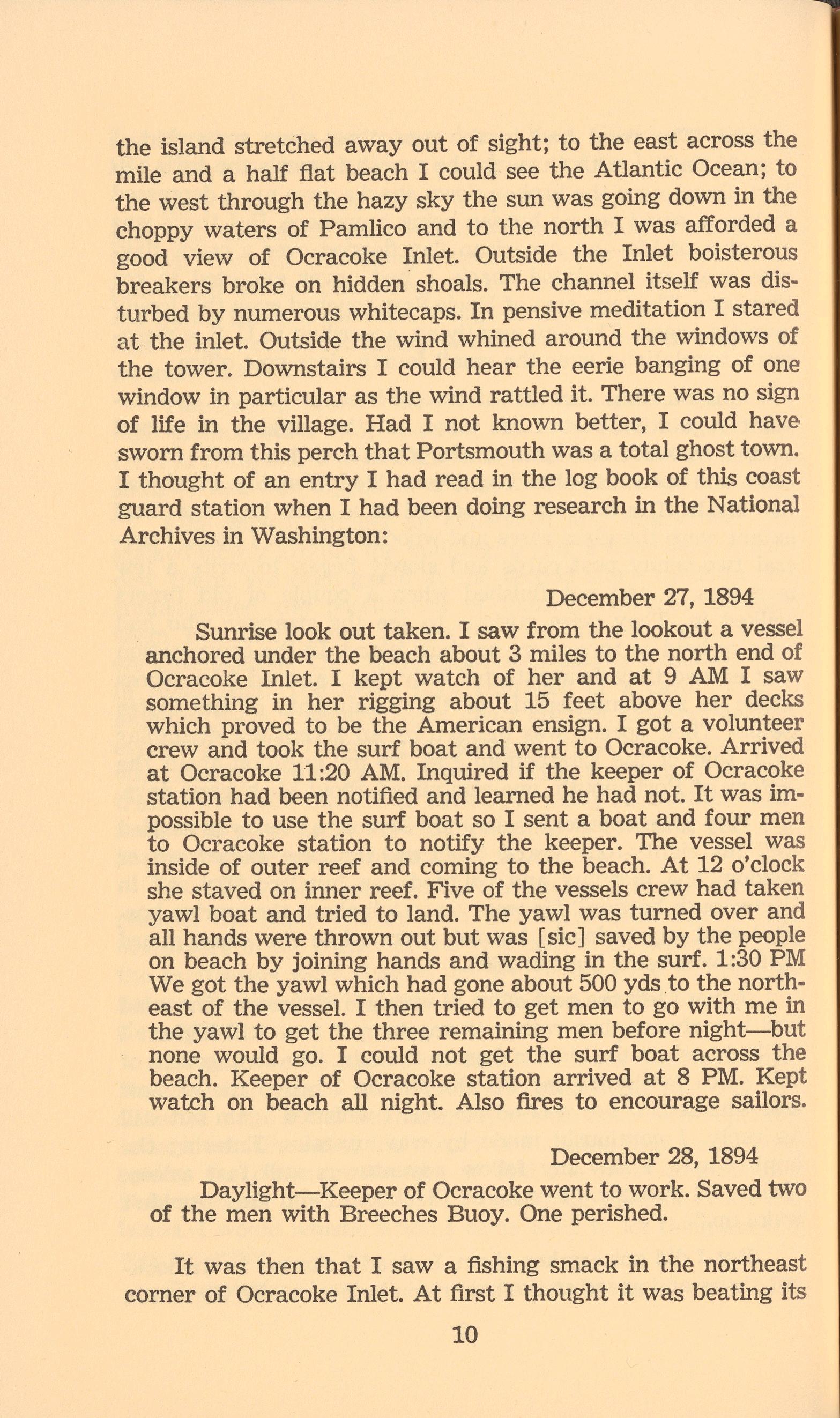
the island stretched away out of sight; to the east across the mile and a half flat beach I could see the Atlantic Ocean; to the west through the hazy sky the sun was going down in the choppy waters of Pamlico and to the north I was afforded a good view of Ocracoke Inlet. Outside the Inlet boisterous breakers broke on hidden shoals. The channel itself was disturbed by numerous whitecaps. In pensive meditation I stared at the inlet. Outside the wind whined around the windows of the tower. Downstairs I could hear the eerie banging of one window in particular as the wind rattled it. There was no sign of life in the village. Had I not known better, I could have sworn from this perch that Portsmouth was a total ghost town. I thought of an entry I had read in the log book of this coast guard station when I had been doing research in the National Archives in Washington:
December 27, 1894
Sunrise look out taken. I saw from the lookout a vessel anchored under the beach about 3 miles to the north end of Ocracoke Inlet. I kept watch of her and at 9 AM I saw something in her rigging about 15 feet above her decks which proved to be the American ensign. I got a volunteer crew and took the surf boat and went to Ocracoke. Arrived at Ocracoke 11:20 AM. Inquired if the keeper of Ocracoke station had been notified and learned he had not. It was impossible to use the surf boat so I sent a boat and four men to Ocracoke station to notify the keeper. The vessel was inside of outer reef and coming to the beach. At 12 o'clock she staved on inner reef. Five of the vessels crew had taken yawl boat and tried to land. The yawl was turned over and all hands were thrown out but was [sic] saved by the people on beach by joining hands and wading in the surf. 1:30 PM We got the yawl which had gone about 500 yds to the northeast of the vessel. I then tried to get men to go with me in the yawl to get the three remaining men before night-but none would go. I could not get the surf boat across the beach. Keeper of Ocracoke station arrived at 8 PM. Kept watch on beach all night. Also fires to encourage sailors.
December 28, 1894
Daylight-Keeper of Ocracoke went to work. Saved two of the men with Breeches Buoy. One perished.
It was then that I saw a fishing smack in the northeast corner of Ocracoke Inlet. At first I thought it was beating its 10
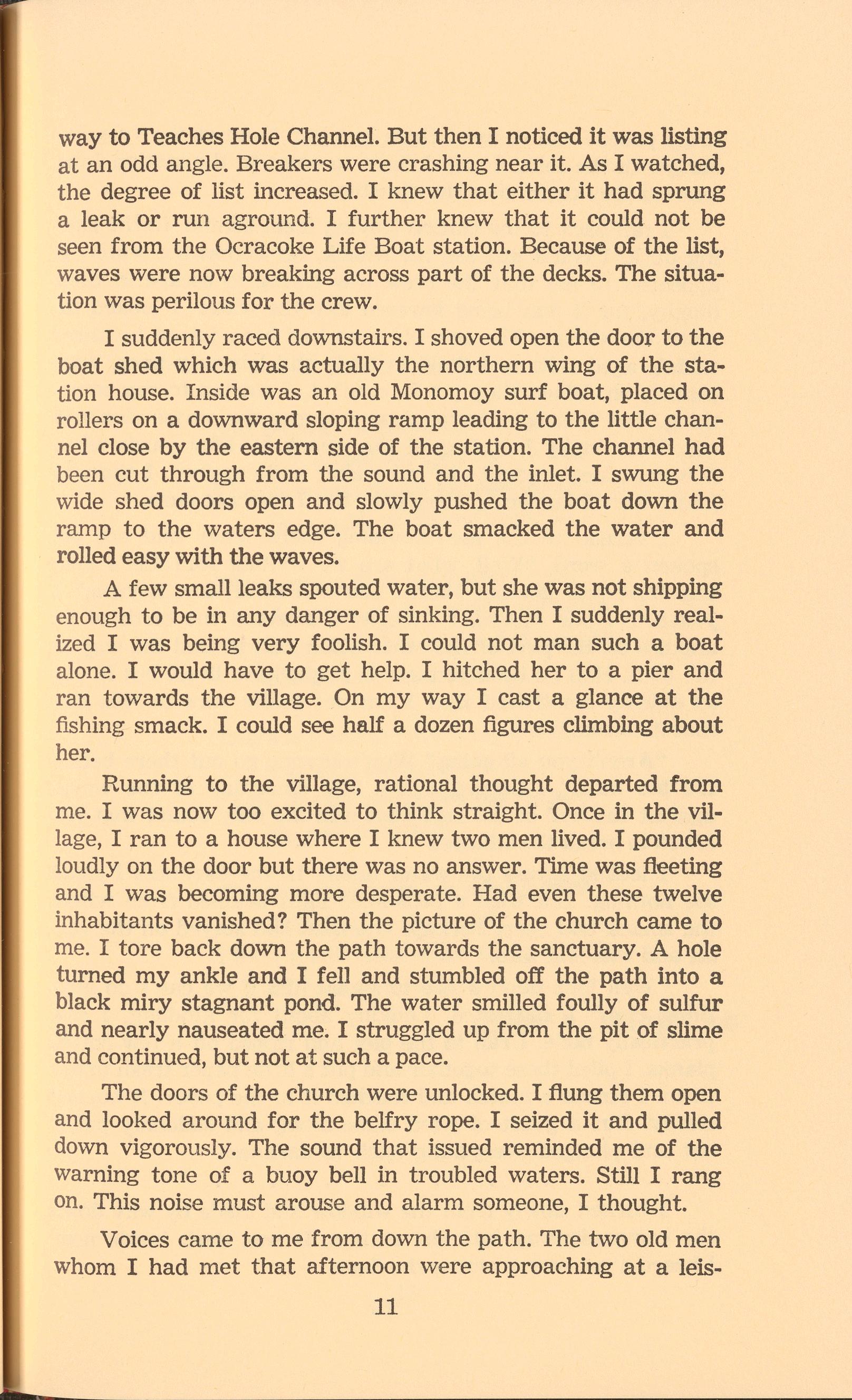
way to Teaches Hole Channel. But then I noticed it was listing at an odd angle. Breakers were crashing near it. As I watched, the degree of list increased. I knew that either it had sprung a leak or run aground. I further knew that it could not be seen from the Ocracoke Life Boat station. Because of the list, waves were now breaking across part of the decks. The situation was perilous for the crew.
I suddenly raced downstairs. I shoved open the door to the boat shed which was actually the northern wing of the stati on house. Inside was an old Monomoy surf boat, placed on r ollers on a downward sloping ramp leading to the little chann el close by the eastern side of the station. The channel had been cut through from the sound and the inlet. I swung the wide shed doors open and slowly pushed the boat down the r amp to the waters edge. The boat smacked the water and ro lled easy with the waves.
A few small leaks spouted water, but she was not shipping enough to be in any danger of sinking. Then I suddenly realized I was being very foolish. I could not man such a boat alone. I would have to get help . I hitched her to a pier and r an towards the village. On my way I cast a glance at the fishing smack. I could see half a dozen figures climbing about her .
Running to the village, rational thought departed from me. I was now too excited to think straight. Once in the village, I ran to a house where I knew two men lived. I pounded loudly on the door but there was no answer. Time was fleeting an d I was becoming more desperate. Had even these twelve inhabitants vanished? Then the picture of the church came to me . I tore back down the path towards the sanctuary. A hole tu rned my ankle and I fell and stumbled off the path into a black miry stagnant pond. The water smilled foully of sulfur an d nearly nauseated me. I struggled up from the pit of slime an d continued, but not at such a pace.
The doors of the church were unlocked. I flung them open and looked around for the belfry rope. I seized it and pulled down vigorously. The sound that issued reminded me of the warning tone of a buoy bell in troubled waters. Still I rang on. This noise must arouse and alarm someone, I thought.
Voices came to me from down the path. The two old men whom I had met that afternoon were approaching at a leis-

urely pace. I ran to meet them and told them of the vessel in danger in the inlet. I urged them to come to the station fro m whence they could view the disaster.
I ran back to the station leaving them behind. In the closing dusk, I could just see the smack, far across the water. It appeared to me that the crew was trying to escape in the ir dinghy, for it was being lowered into the water. I looked t oward the village. The two old men had been joined by th ree middle aged salts and they, at their still leisurely pace, were coming on. When they got in earshot, I started to say something, but the sight which I saw acros s the water sicken ed me. The dinghy had cleared the smack by fifty yards wh en it was suddenly caught by a breaker and capsized. I thou ght I saw men floundering around it, but I was not sure.
I turned to the men standing there. They had not yet spoken a word. "Well, what are we waiting for? Let's m an this boat and get out there. You can steer, Mr. Styron ," I yelled. No one moved. I thought I detected the birth of an impulse on the part of the other older man to lead the way to the boat. Had he been younger it might have lived, but it was so quickly smothered that I am not really sure to this day that it existed.
"Aren't you all going? Won't anyone go out there befo re it's too late?" I begged again. The smacking of the wav es against the hull of the surf boat was the only sound that followed to break the stillness.
I looked across the water again. In the darkness I could see nothing. But then a prolonged light beamed from whe re the smack had been. Perhaps one man had stayed on the vessel and was still safe.
"Well let's build a fire to signal him if we can't do an ything else," I suggested. Looking about for kindling, I saw practically none. I ran to the pier and ripped off a few rott en planks. I piled these together and put a little paper trash und er them. I struck a match and touched it to the paper. It burn ed slowly. But a guest of wind came along and suddenly put it out and plunged everything back to darkness.
I turned slowly from the window and made by way down the companionway into the station. It was dark inside now. I heard a rat scurry across the floor.
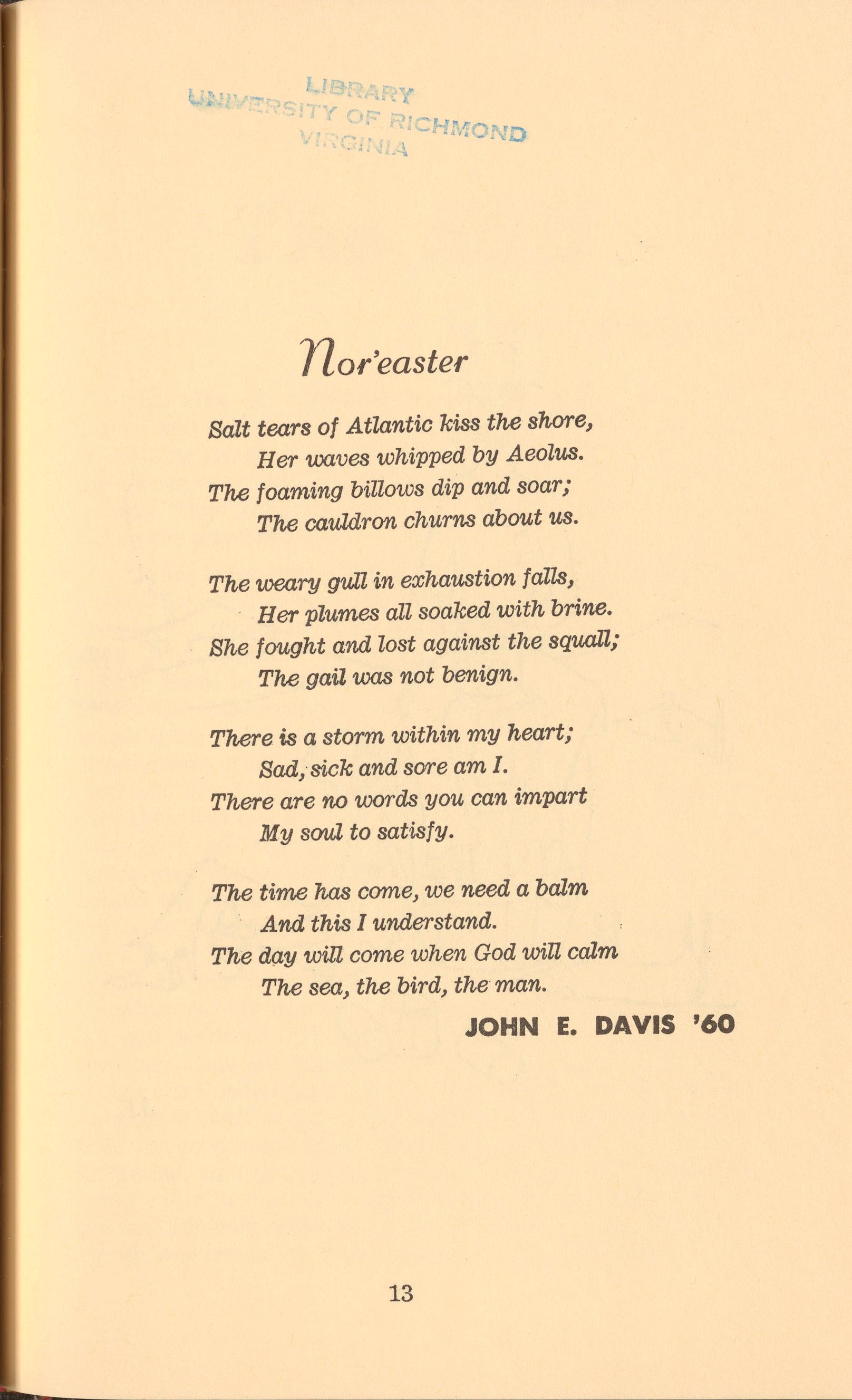
Salt toors of Atlantic kiss the shore, Her waves whipped by Aeolus. The foaming billows dip and soar; The cauldron churns about us.
The weary gull in exhaustion falls, Her plumes all soaked with brine. She fought and lost against the squall; The gail was not benign.
There is a storm within my heart; Sad, sick and sore am I. There are no words you can impart My saul to satisfy.
The time has come, we need a balm And this I understand. The day will come when God will calm The soo, the bird, the man.


By RICHARD ROBERTS '60
The hills of Tennessee hide many things-things of beauty and things of a more practical vein. Such is the case of the hills around Zeke Willis' place. Zeke is (or rather was) the owner of a still, one of the finest in our section of the country. How Zeke lost his still is the object of this story. This is the way Zeke tells it.
"Willis is my name, but my neighbors call me Zeke. When anybody wanted some white lightnin' they always said thet they had to go see me 'bout a dog. That was how I made my livin'. White lightnin' is the name thet we give to the corn lickker made in these parts. Hit's good stuff, and only onct in a while does somebody git sick frum hit. Thet's how the whole thing tightened down on me anyhow. The Red Riders (revenooers) ware alright 'til this kid got aholt of some fresh stuff and drank three fruit jars of it right straight. When he died they had one of them autotopsys and found out what it wuz. Well, hit wuz my lickker, thet's what hit wuz, only I didn't give hit to him. He had pinched hit frum the shed behind the house and I didn't miss hit 'til after he got sick. Hit took 'bout four hours to lay him out anyhow. Well, the boy's folks Mr. and Mrs. Cavendish got riled up (not thet I blame 'em but they shoulda' showed the young'un how to hold his whiskey.) He wuz 'most fourteen and they knowed he wuz old mlff to drink. His folks went and told the sheriff where the scamp had got hit and Sheriff Riley come out to pay me a visit one Sunday. Don't git me rong-the Sheriff likes white lightnin' as well as the rest of us, but he had a job to do and thet was to put me out of business. I kinda figured thet he'd he 'round, so I got ready for him. I had a small still so's I could cover hit up easier and move hit 'round without much trouble. Hit only made about ten gallons at a crack, but since spring was comin' on I was runnin' out of corn anyway. 'Ere 15
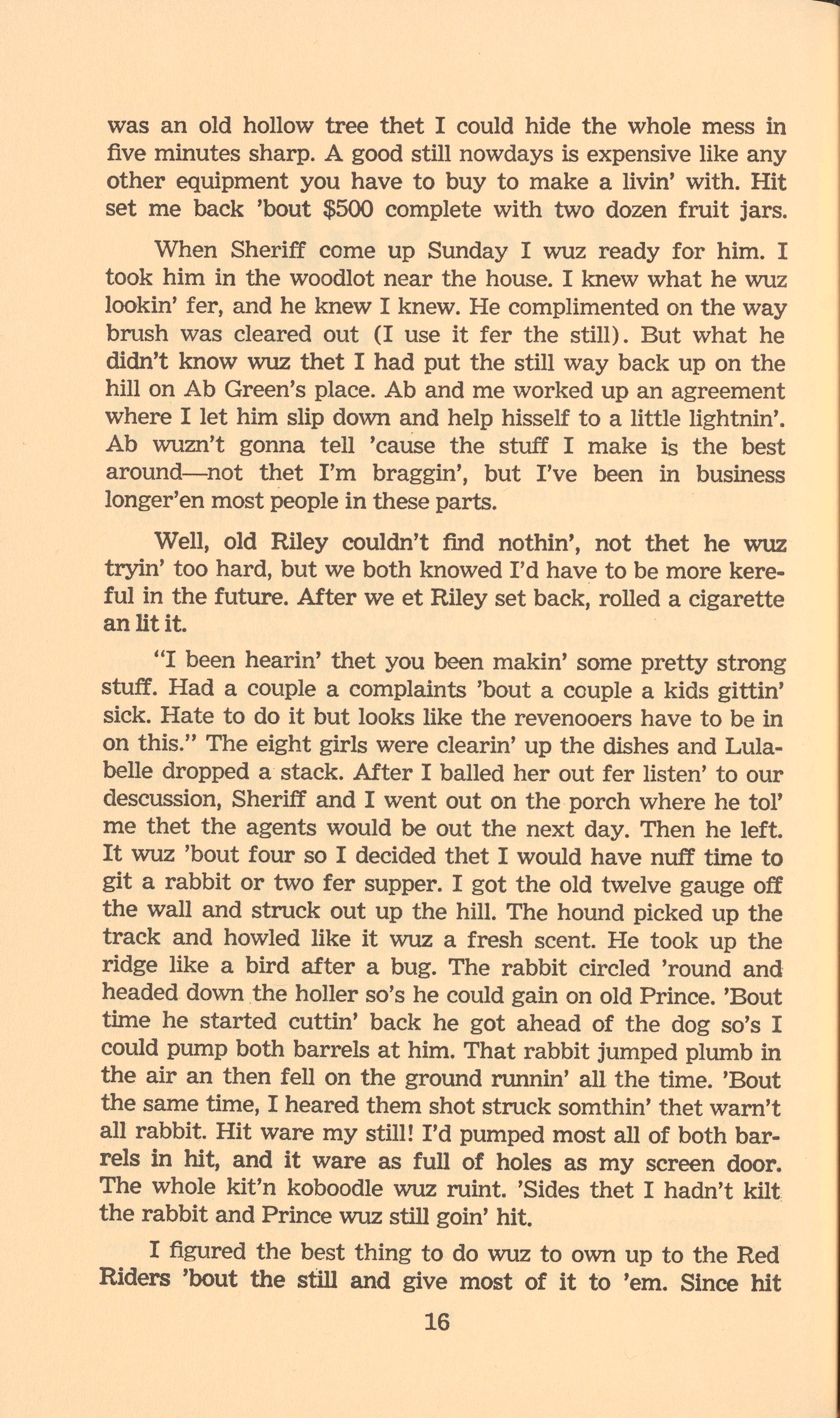
was an old hollow tree thet I could hide the whole mess in five minutes sharp. A good still nowdays is expensive like any other equipment you have to buy to make a livin' with. Hit set me back 'bout $500 complete with two dozen fruit jars.
When Sheriff come up Sunday I wuz ready for him. I took him in the woodlot near the house. I knew what he wuz lookin' fer, and he knew I knew. He complimented on the way brush was cleared out {I use it fer the still). But what he didn't know wuz thet I had put the still way back up on the hill on Ab Green's place. Ab and me worked up an agreement where I let him slip down and help hisself to a little lightnin'. Ab wuzn't gonna tell 'cause the stuff I make is the best around-not thet I'm braggin', but I've been in business longer'en most people in these parts.
Well, old Riley couldn't find nothin', not thet he wuz tryin' too hard, but we both knowed I'd have to be more kereful in the future. After we et Riley set back, rolled a cigarette an lit it.
"I been hearin' thet you been makin' some pretty strong stuff. Had a couple a complaints 'bout a couple a kids gittin' sick. Hate to do it but looks like the revenooers have to be in on this." The eight girls were clearin' up the dishes and Lulabelle dropped a stack. After I balled her out fer listen' to our descussion, Sheriff and I went out on the porch where he tol' me thet the agents would be out the next day. Then he left. It wuz 'bout four so I decided thet I would have nuff time to git a rabbit or two fer supper. I got the old twelve gauge off the wall and struck out up the hill. The hound picked up the track and howled like it wuz a fresh scent. He took up the ridge like a bird after a bug. The rabbit circled 'round and headed down the holler so's he could gain on old Prince. 'Bout time he started cuttin' back he got ahead of the dog so's I could pump both barrels at him. That rabbit jumped plumb in the air an then fell on the ground runnin' all the time. 'Bout the same time, I heared them shot struck somthin' thet warn't all rabbit. Hit ware my still! I'd pumped most all of both barrels in hit, and it ware as full of holes as my screen door. The whole kit'n koboodle wuz ruint. 'Sides thet I hadn't kilt the rabbit and Prince wuz still goin' hit.
I figured the best thing to do wuz to own up to the Red Riders 'bout the still and give most of it to 'em. Since hit 16
warn't no good anyways. Next day when they come out I give it to 'em and tolt 'em thet I wuz givin' hit up 'cause I wuz sorry seein' hows thet somebody got sick. They wuz real nice and left in 'bout half an hour.
I done sent fer a bigger un; hit ought to git here next week. Prince got the rabbit too."
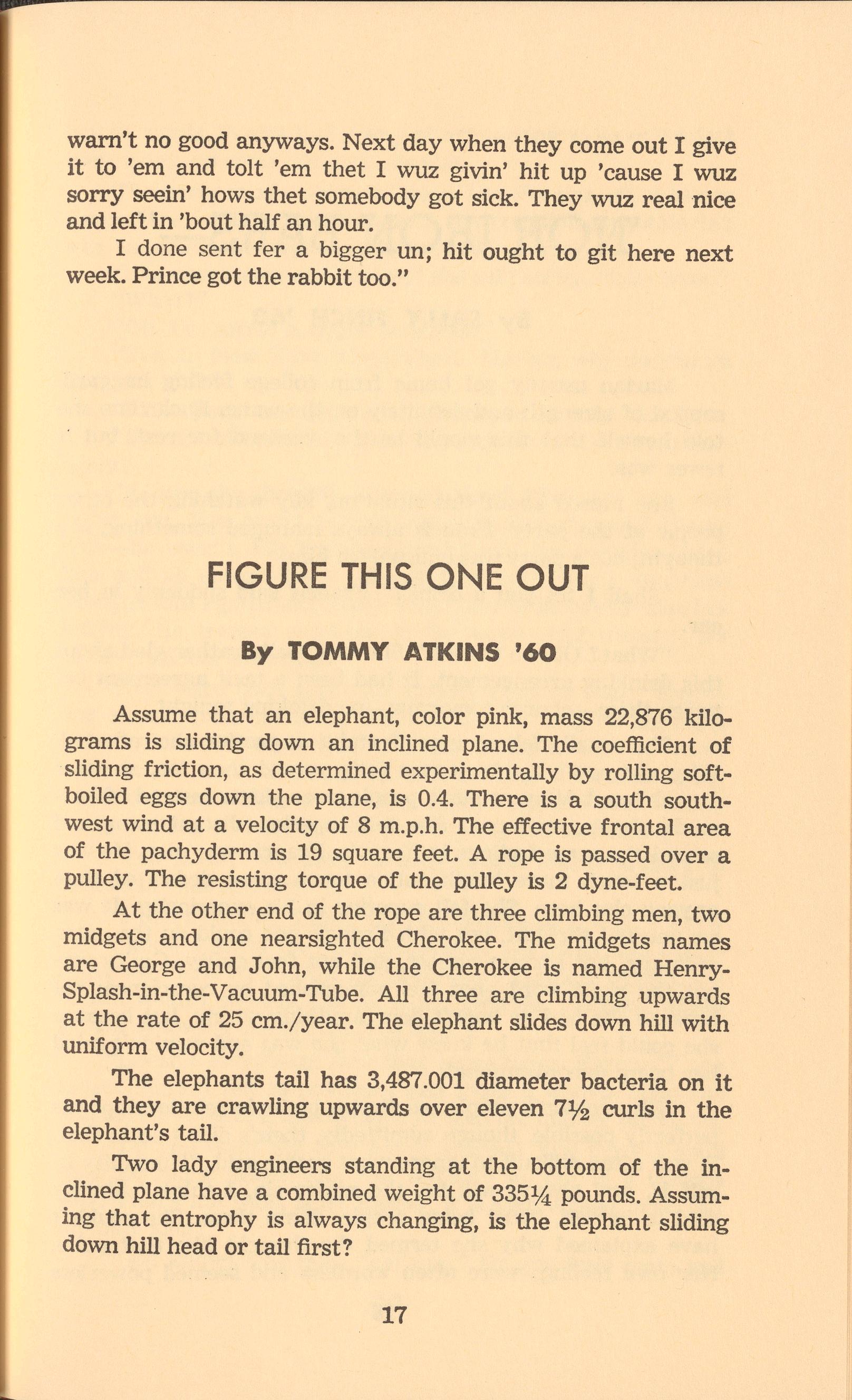
Assume that an elephant, color pink, mass 22,876 kilograms is sliding down an inclined plane. The coefficient of sliding friction, as determined experimentally by rolling softboiled eggs down the plane, is 0.4. There is a south southwest wind at a velocity of 8 m.p.h. The effective frontal area of the pachyderm is 19 square feet. A rope is passed over a pulley. The resisting torque of the pulley is 2 dyne-feet.
At the other end of the rope are three climbing men, two midgets and one nearsighted Cherokee. The midgets names are George and John, while the Cherokee is named HenrySplash-in-the-Vacuum-Tube. All three are climbing upwards at the rate of 25 cm./year. The elephant slides down hill with uniform velocity.
The elephants tail has 3,487.001 diameter bacteria on it and they are crawling upwards over eleven 7½ curls in the elephant's tail.
Two lady engineers standing at the bottom of the inclined plane have a combined weight of 335¼ pounds. Assuming that entrophy is always changing, is the elephant sliding down hill head or tail first?
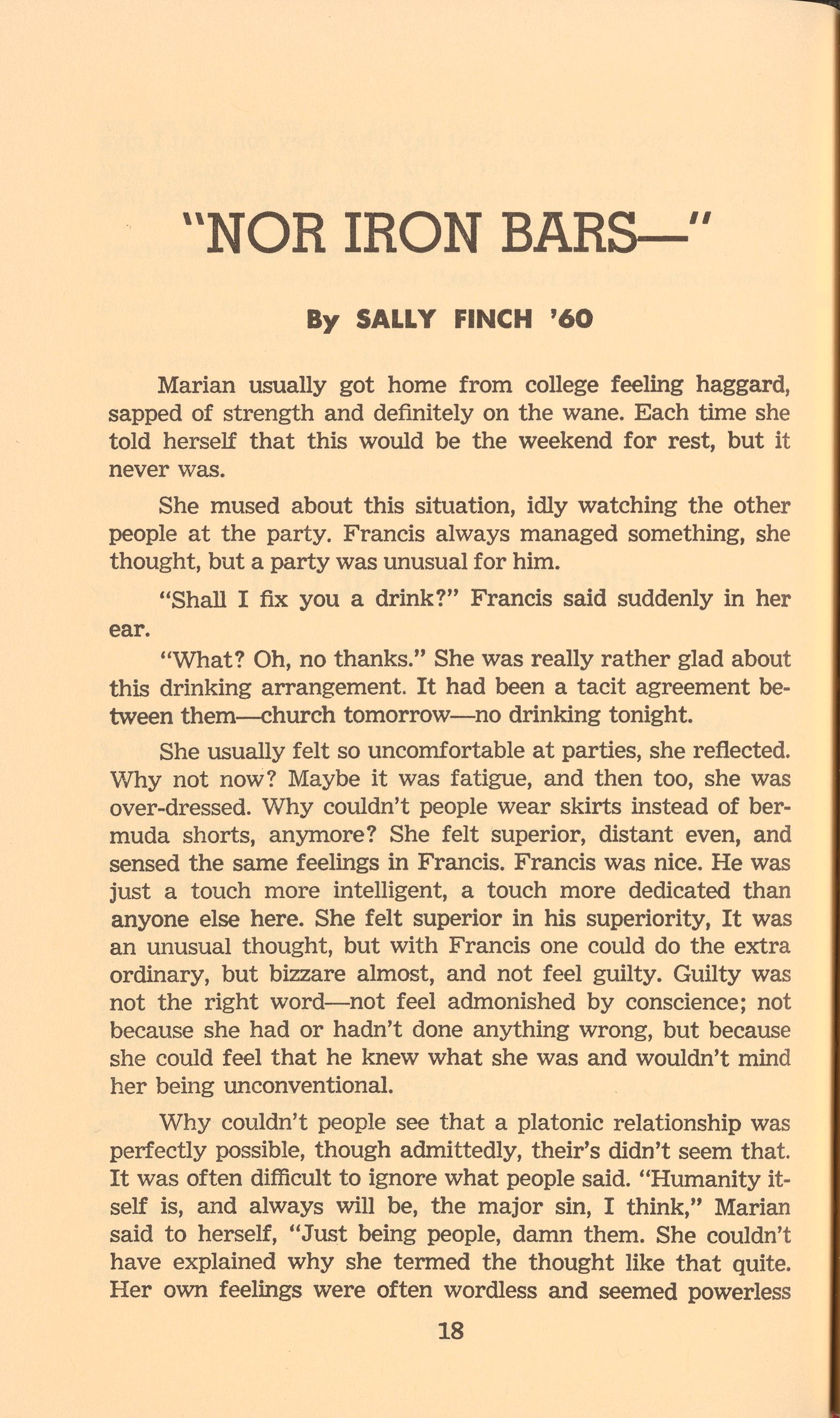
By SALLY FINCH '60
Marian usually got home from college feeling haggard , sapped of strength and definitely on the wane. Each time she told herself that this would be the weekend for rest, but it never was.
She mused about this situation, idly watching the othe r people at the party. Francis always managed something, sh e thought, but a party was unusual for him.
"Shall I fix you a drink?" Francis said suddenly in he r ear.
"What? Oh, no thanks." She was really rather glad abou t this drinking arrangement. It had been a tacit agreement between them----church tomorrow-no drinking tonight.
She usually felt so uncomfortable at parties, she reflected. Why not now? Maybe it was fatigue, and then too, she was over-dressed. Why couldn't people wear skirts instead of bermuda shorts, anymore? She felt superior, distant even, an d sensed the same feelings in Francis. Francis was nice . He was just a touch more intelligent, a touch more dedicated tha n anyone else here. She felt superior in his superiority, It wa s an unusual thought, but with Francis one could do the extr a ordinary, but bizzare almost, and not feel guilty. Guilty wa s not the right word-not feel admonished by conscience; not because she had or hadn't done anything wrong, but becaus e she could feel that he knew what she was and wouldn't min d her being unconventional.
Why couldn't people see that a platonic relationship wa s perfectly possible, though admittedly, their's didn't seem tha t. It was often difficult to ignore what people said. "Humanity itself is, and always will be, the major sin, I think," Marian said to herself, "Just being people, damn them. She couldn' t have explained why she termed the thought like that quite . Her own feelings were often wordless and seemed powerles s 18

before words. People had a way of attempting to be or project their being, on some one, any one else.
The party music tempered down and Francis asked her to dance. They waltzed slowly about the crowded floor. Marian was watching the doped pianist with fascination.
"I've never seen one before," she said softly, "have you?" "What?"
"Oh, I'm sorry. A doped musician.''
"Yes. In New York. Everywhere. Marian, why do you go out with me?"
"I like you," she answered. "And you're very nice."
"I'm not nice. I can't offer you anything," he stated savagely.
Oh, yes, she thought. She said aloud, "You are nice, and I like you. You aren't a run-of-the-mill sort of man." It was true--he wasn't. His friends admired him, his enemies hated him and all envied his air of self-confidence. Many doubtless thought him egotistical; many knew him to be overly discriminating. He treated everyone in the same aloof manner, his reserve seldom breaking.
They were both silent for awhile. Then he said, "Everyone should have an ideal, Marian, but as long as anything can touch me I'll never live up to mine. And I won't be worth a damn if I don't. I often feel that nothing can stand in my way, but something is always there--myself." He wasn't really talking to her; he was just musing introspectively.
"You know," she said, "I wish I could find something to believe in that fiercely.''
"I don't believe. I only try. It's shame in a way. I know and I know I know that one temptation too many and everything will 'PHFFT!' down the drain-my tangible wealth, my mind's wealth, myself-off to South America, Jamaica, Shangri-La. Knowing doesn't seem to help.''
"Doesn't everybody face that same thing, Francis?" she asked. Marian felt sympathetic and more a woman than she had ever felt before. She decided to take the bull by the horns.
"Do you want my very frank opinion? You think a good deal too much about you. Not selfishly so, but in a curious way. That's not sane, is it? Rather, it is sane enough now, but for how long?"
"God knows," he said. "Let's go." He got their coats and 19

they silently left the party. It took him a good fifteen minute s to get the car unparked, and Marian could feel his tensio n mounting.
"Where to, Miss?" Francis growled realistically. "Home, Jeeves," she giggled, playing the game. They drove aimlessly about for awhile. It was getting la te. "Let's go to the mountain, Francis," she said suddenl y. That was always her haven . She hated to think of people she didn't know or like in the sacred precincts of her mou ntain. It was a tangible symbol of all in which Marian believed, and all for which she lived. It soothed her whenever she went there . And she never went unless she needed the soothin g. Repeating something wonderful often dulled the wonder of it for her.
Francis was driving slowly toward the ir mountain, a da rk blot on the dark sky. Anyone else would have said somethin g about-"On a night like this-after all this rain!" and on; but not Francis. Marian had often wondered if the mounta in had the same effects on anyone else that it had on her. She knew now.
They stopped at the barrier and the road-closed sign was there for all to see. There was no question-they'd walk. Mysterious night, mysterious wind, mysterious us, Mari an thought. Actually, it was peculiar. There was just enough light to see the mud puddles behind, but nothing of the path ahea d. The blackness of the distance had cavernous features, porte ntious of something darkly ominous . The large rocks beside t he road looked like shadows while their shadows strangely resembled big bears. She shuddered.
"Not bears," said Francis, divining her thoughts, "n ot bears, wild-cats." He was laughing at her.
How strange, she thought. She wondered how powerf ul Francis' mind was. It frightened her; but if he knew tho se thoughts too, he kept silent.
She listened carefully to the wind. Poor wind that te lls such tales, sometimes. It was not in a yarn-spinning mood tonight. It was howling. Or perhaps it was the pine trees howling because the wind was so strong; or perhaps they couldn 't even feel the cold. Marian looked up at the sky. The sta rs were really there for the first time in days . She could count them tonight, she felt.
(Continued on Page 40)
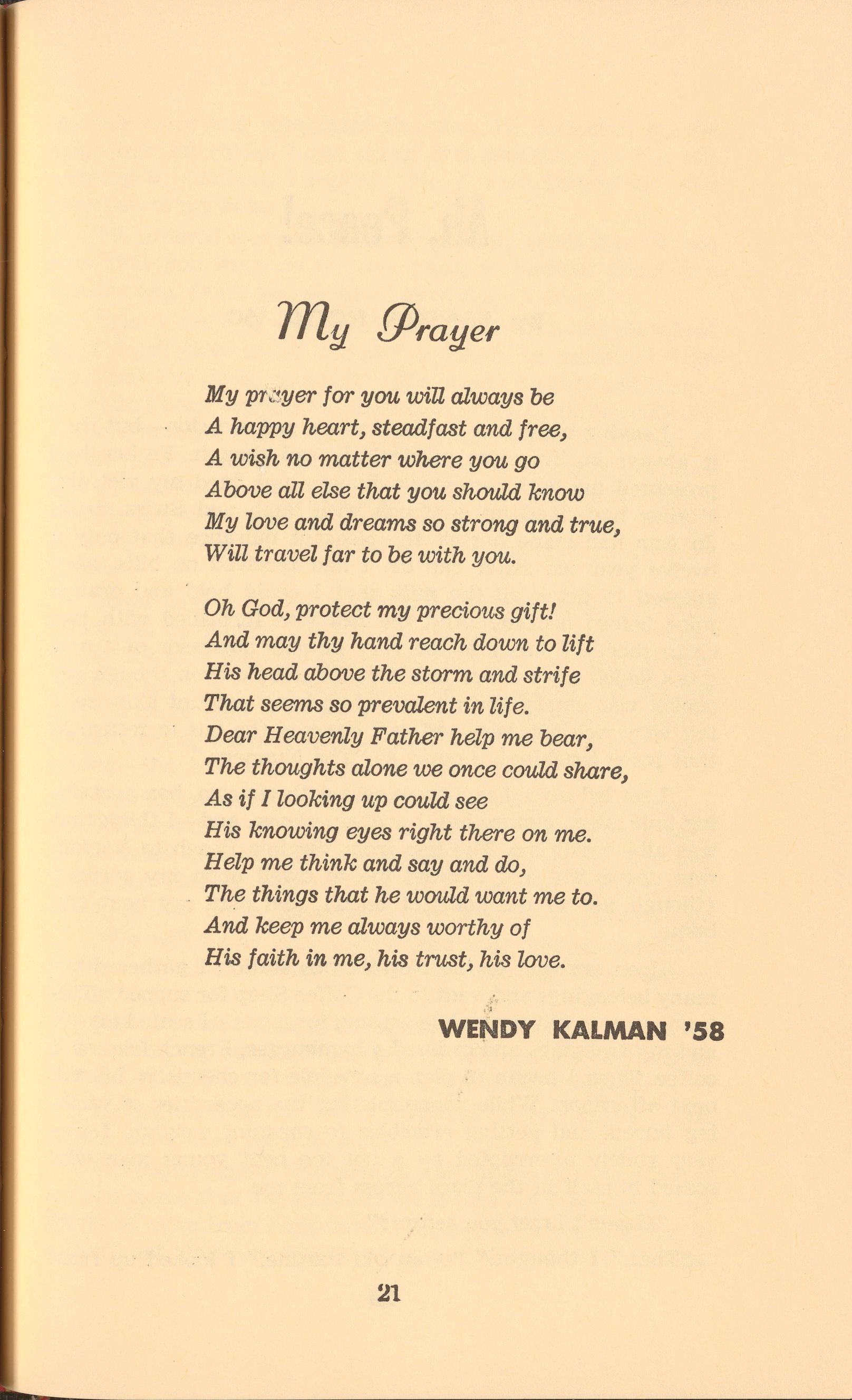
My pr .:iyer for y<YUwill always be A ha'fYPYheart, steadfast and free, A wish no matter where y<YUgo Above <ill e"lsethat you should know My love and dreams so stron,g and true, Will travel far to be with y<YU.
Oh God, protect my precious gift! And may thy hand reach down to lift His head above the storm and strife That seems so prevalent in life. Dear Heavenly Father he7,pme bear, The th<YUghtsalone we once could share, As if I looking up c<YUldsee His knowing eyes right there on me. Help me think and say and do, The things that he would want me to. And keep me always worthy of His faith in me, his trust, his love.
By SANDRA HOOD '60

Leaving home last weekend was a sad occasion-but th en it always is. This was particularly sad though. Father h ad presented me with two steak dinners and fixed my victro la; Mother had filled my stomach with lamb and Swiss ste ak. Jo Ann had made herself the pleasant nuisance that only a twelve year old sister can be. I had received no bills, been allowed to drink all the milk that I could hold and oran ge juice before bedtime. And the bed was furnished with two clean sheets. I was also the very humble possessor of a n ew dress which my mother had knit for me. So even though my pocket was empty and my mixed-up bank account likewise , I felt very rich and very sad as I boarded the bus to return to that place laughingly known as "The Nunnery."
I settled myself in a front seat with victrola, box conta ining knit dress, picture hat, handbag, gloves, and-I think t hat was all-beside me. The trip from Virginia Beach to Norfo lk was uneventful and allowed me to dwell upon my sorro ws (though not to the point of tears), and plan my next trip home.
Upon arriving in the Norfolk bus station I gathered my many belongings and went to the Coffee Shop for supper. (T his is one way to kill time while waiting for a bus.) I seated mys elf and my trappings and ordered a hamburger, French-fries, an d coffee. Then I began to plan a schedule for chemistry lab the next afternoon. While contemplating the necessities of was hing burets and getting crucibles to constant weights, I was very rudely interrupted by a not too neat young man who seated himself in the place across from me.
"Haven't I met you before?"
"That," I thought," "is an old routine." I looked up fro m 22
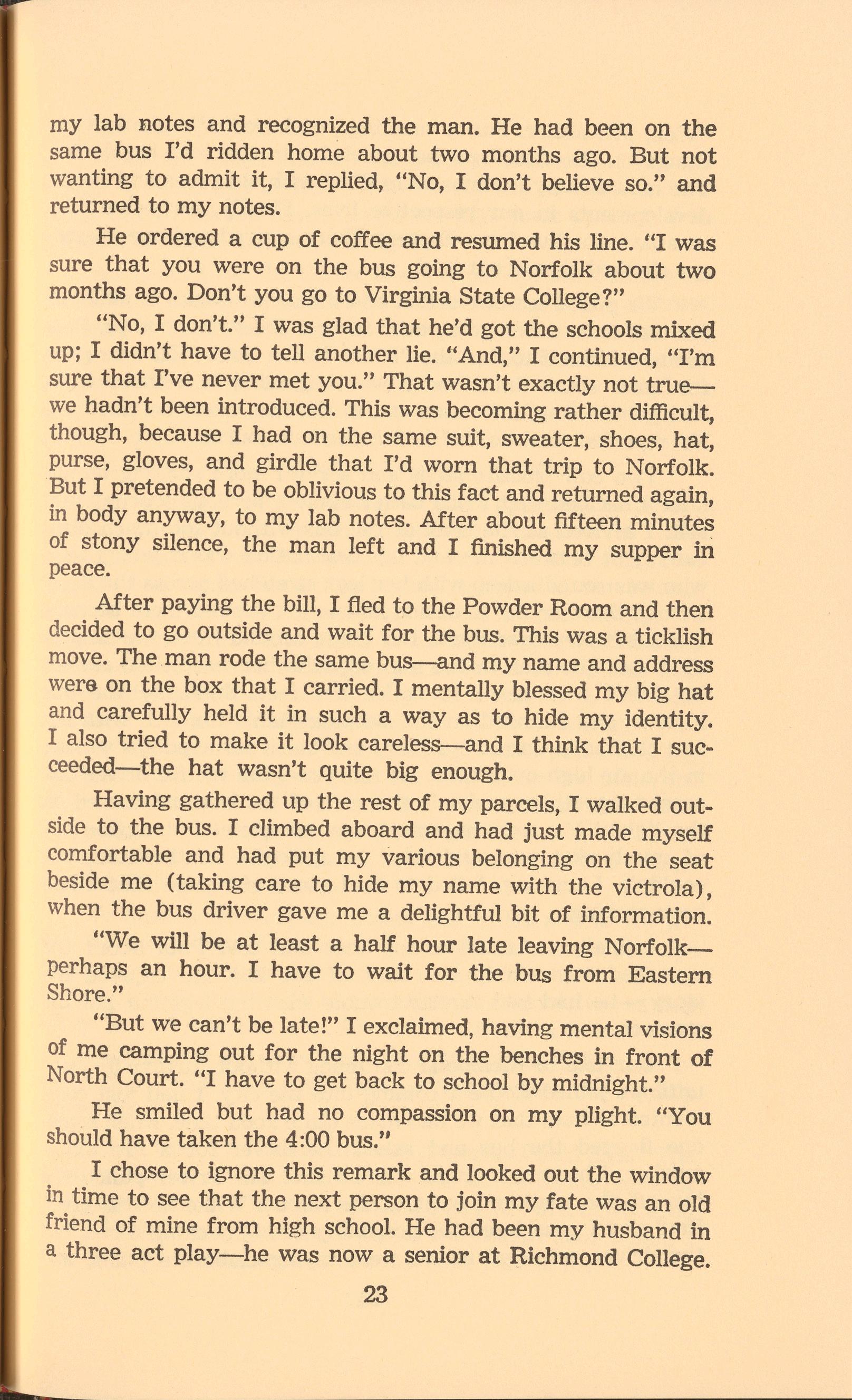
my lab notes and recognized the man. He had been on the same bus I'd ridden home about two months ago. But not wanting to admit it, I replied, "No, I don't believe so." and returned to my notes.
He ordered a cup of coffee and resumed his line. "I was sure that you were on the bus going to Norfolk about two months ago. Don't you go to Virginia State College?"
"No, I don't." I was glad that he'd got the schools mixed up ; I didn't have to tell another lie. "And," I continued, "I'm sur e that I've never met you." That wasn't exactly not true-we hadn't been introduced. This was becoming rather difficult, th ough, because I had on the same suit, sweater, shoes, hat, pur se, gloves, and girdle that I'd worn that trip to Norfolk. But I pretended to be oblivious to this fact and returned again, in body anyway, to my lab notes . After about fifteen minutes of stony silence, the man left and I finished my supper iri peace.
After paying the bill, I fled to the Powder Room and then decided to go outside and wait for the bus. This was a ticklish move. The man rode the same bus-and my name and address wers on the box that I carried. I mentally blessed my big hat and carefully held it in such a way as to hide my identity. I a lso tried to make it look careless-and I think that I succeeded-the hat wasn't quite big enough.
Having gathered up the rest of my parcels, I walked out- side to the bus. I climbed aboard and had just made myself comfortable and had put my various belonging on the seat beside me (taking care to hide my name with the victrola), when the bus driver gave me a delightful bit of information.
"We will be at least a half hour late leaving Norfolk- perh aps an hour. I have to wait for the bus from Eastern Shore ."
"But we can't be late!" I exclaimed, having mental visions of me camping out for the night on the benches in front of North Court. "I have to get back to school by midnight."
He smiled but had no compassion on my plight . "You should have taken the 4:00 bus."
I chose to ignore this remark and looked out the window in time to see that the next person to join my fate was an old friend of mine from high school. He had been my husband in a th ree act play-he was now a senior at Richmond College.
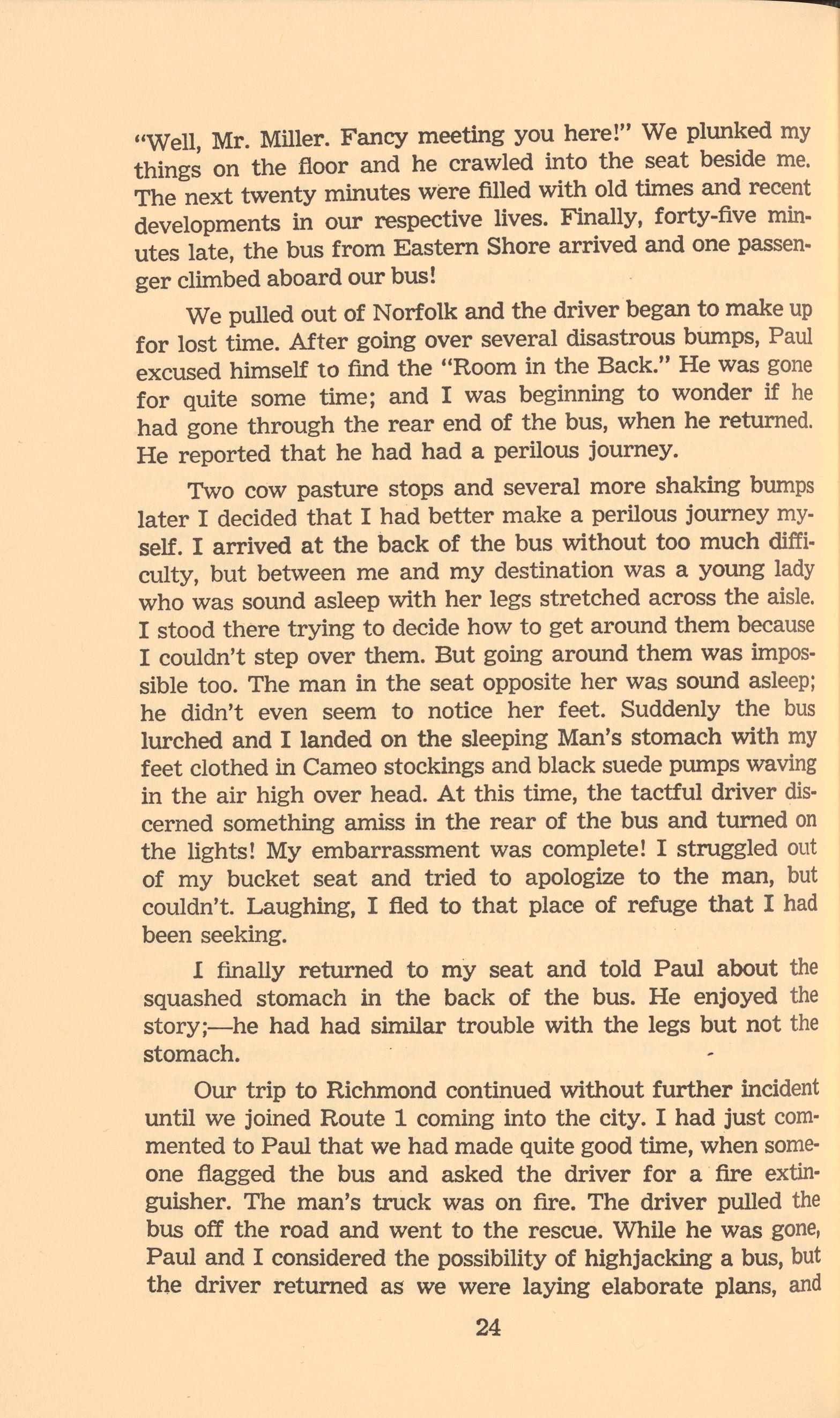
"Well, Mr. Miller. Fancy meeting you here!" We plunked my things on the floor and he crawled into the seat beside me. The next twenty minutes were filled with old times and rec ent developments in our respective lives. Finally, forty-five minutes late, the bus from Eastern Shore arrived and one pass enger climbed aboard our bus!
We pulled out of Norfolk and the driver began to mak e up for lost time. After going over several disastrous bumps, P aul excused himself to find the "Room in the Back." He was gone for quite some time; and I was beginning to wonder if he had gone through the rear end of the bus, when he retu rned. He reported that he had had a perilous journey.
Two cow pasture stops and several more shaking b umps later I decided that I had better make a perilous journey myself. I arrived at the back of the bus without too much di fficulty, but between me and my destination was a young lady who was sound asleep with her legs stretched across the a isle. I stood there trying to decide how to get around them bec ause I couldn't step over them. But going around them was impossible too. The man in the seat opposite her was sound asl eep; he didn't even seem to notice her feet. Suddenly the bus lurched and I landed on the sleeping Man's stomach with my feet clothed in Cameo stockings and black suede pumps wav ing in the air high over head. At this time, the tactful driver discerned something amiss in the rear of the bus and turned on the lights! My embarrassment was complete! I struggled out of my bucket seat and tried to apologize to the man, but couldn't. Laughing, I fled to that place of refuge that I had been seeking.
I finally returned to my seat and told Paul about the squashed stomach in the back of the bus. He enjoyed the story;-he had had similar trouble with the legs but not the stomach.
Our trip to Richmond continued without further incident until we joined Route 1 coming into the city. I had just commented to Paul that we had made quite good time, when someone flagged the bus and asked the driver for a fire extinguisher. The man's truck was on fire. The driver pulled the bus off the road and went to the rescue. While he was gone, Paul and I considered the possibility of highjacking a bus, but the driver returned as we were laying elaborate plans, and 24

we were forced to abandon the idea.
When we pulled into the Richmond station, Paul heaved a sigh of relief and invited me to have a cup of coffee before going out to school. Since the driver had made up forty-five minutes in fifteen minutes, I accepted.
We headed for the Coffee Shop, deposited our bundles on a table and sat down. Paul ordered the coffee and the waitress brought it in amazingly good time; then, as we rested our elbows on the table, coffee, table, sugar, pepper, salt, and napkins went crashing to the floor. My reflexes were in excellent condition and I escaped coffee stains but Paul and my victrola weren't quite so lucky. Paul's trousers were soaked and my victrola drank what was left of two cups of coffee.
The manager came rushing to what appeared to be our rescue, but he ignored us and immediately examined the table. "The screws are out" he informed us in a tone that suggested that we had taken them. But having redeposited our belongings on another table previously tested before sitting, we weren't particularly interested in his excuses or accusations. He 'kindly' ordered a second round of coffee for us and then proceeded to put the table back up-sans screws. A few minutes later the janitor appeared on the scene to mop up whatever. coffee had not been consumed by Paul's pants and my victrola. While stooping to push the mop under the table, the table crashed upon his head and delivered a resounding blow to it and, consequently, his ego. As he left the scene, his choice of vocabulary was not censored for the benefit of two college students enjoying his discomfort.
We quickly finished our coffee and hailed a taxi. All the way to school our fingers were crossed. Anymore mishaps would have been disastrous to our already heavily taxed sanity. I even took the liberty of reminding the taxi driver to stop before he ran into the lake. I wasn't ready for a swim.
Much to our relief we arrived at Richmond College without further accidents and the trip to Westhampton was equally uneventful.
"After that trip," I told the cab driver as I paid him, "The m~ss confusion of the fourth floor will be an atmosphere of quiet tranquility." With that remark, I left him in a bewildered state of mind, and made my way to the fourth floor where I uncrossed by fingers as I closed my door behind me.
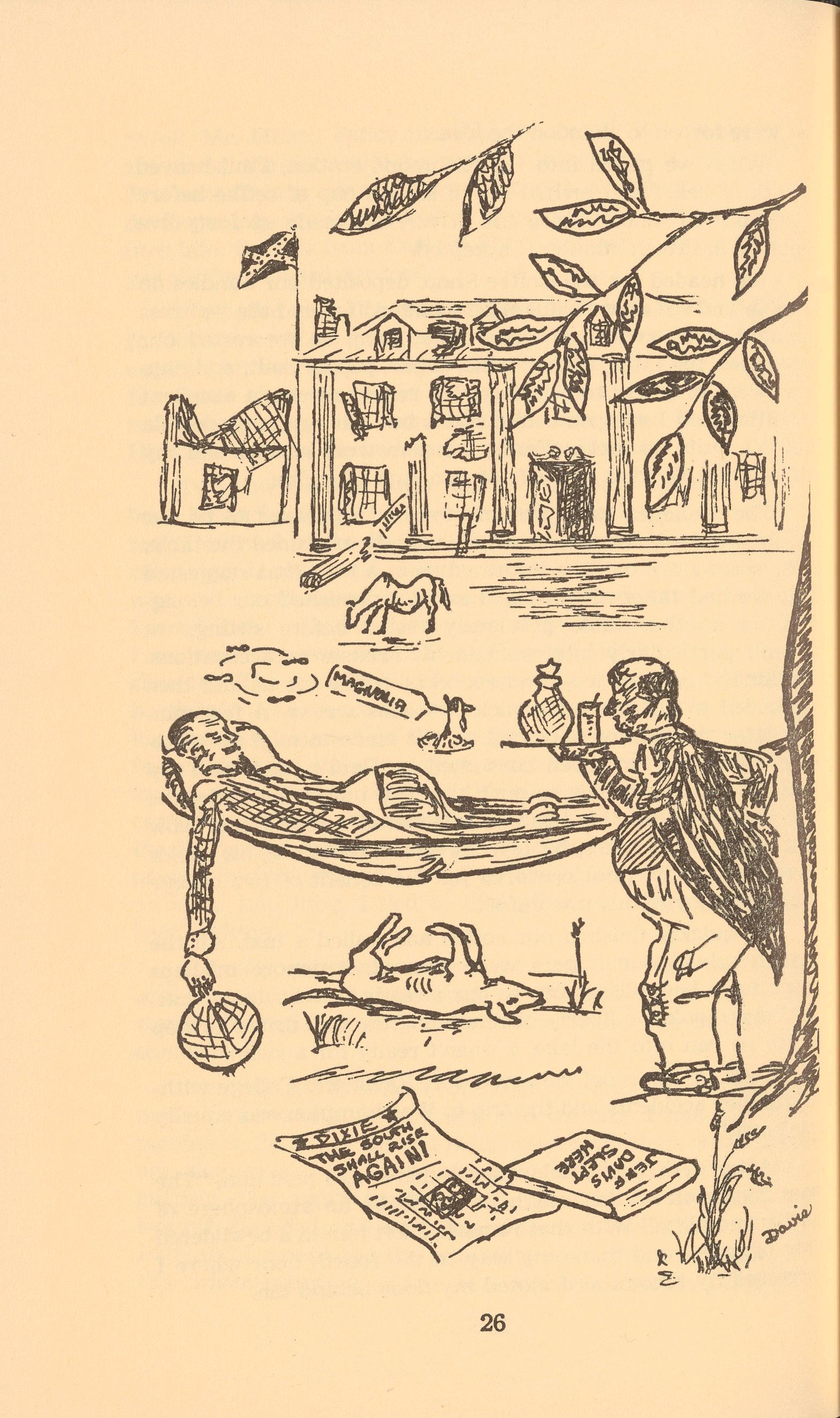
By TED NORDENHAUG '60

Colonel Burpington Dunaway Ashworth lay relaxed in a hammock which stretched invitingly between two pine trees. He was engrossed in deep study. Specifically, he was reflecting on the mint julep in his hand. In the first place, he thought the drink needed some ice. He had been drinking his mint juleps without any ice for a week now and he was getting tired of it. Time and again, he had told the maid to buy some ice. Why she hadn't done so was something he could not understand. Lately he had thought ~.eriously of firing her, but luckily the cooler aspect of his nature had prevailed, for where else could you get a maid these days who would want only six dollars a week? The colonel sighed dejectedly. Next, he thought darkly, he would be drinking his mint juleps without any mint. This simple incident was enough to send the good colonel into an extended chain of gloomy thought. He stared dismally at the pine trees in his backyard. He had always wished that they could have been magnolias. There had been one magnolia on the plantation, but it had been afflicted with some sort of fungus and had lost all its leaves. Last year the colonel had let the tree surgeon fill it up with cement; it died shortly thereafter. Now it just stood there rotting in the front yard. It had gotten its just reward. As far as the colonel was concerned, it could just sit there and rot.
The colonel was awakened suddenly from these diabolic 27
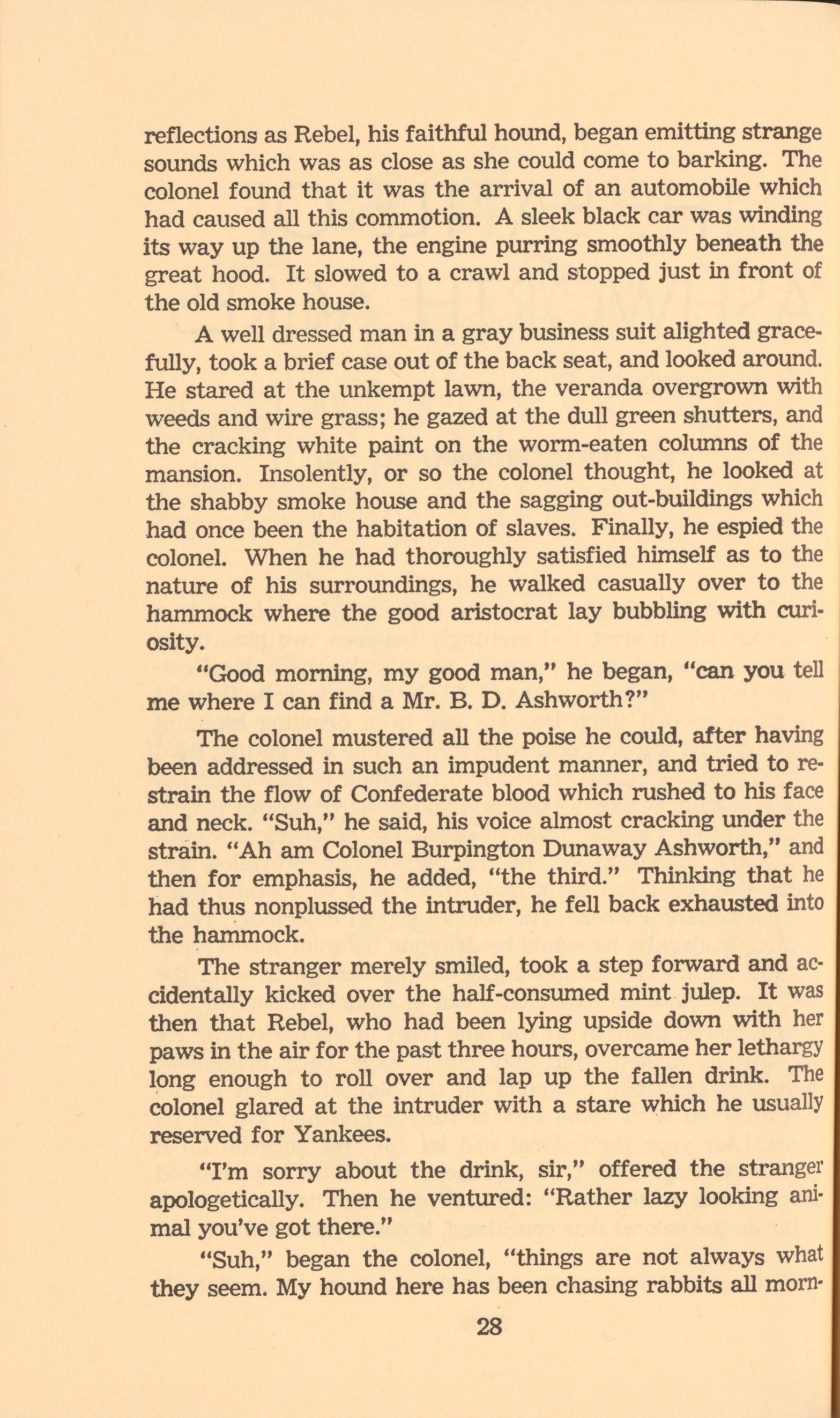
reflections as Rebel, his faithful hound, began emitting strang e sounds which was as close as she could come to barking. Th e colonel found that it was the arrival of an automobile whic h had caused all this commotion. A sleek black car was windin g its way up the lane, the engine purring smoothly beneath th e great hood. It slowed to a crawl and stopped just in front of the old smoke house .
A well dressed man in a gray business suit alighted grac efully, took a brief case out of the back seat, and looked aroun d. He stared at the unkempt lawn, the veranda overgrown with weeds and wire grass; he gazed at the dull green shutters, an d the cracking white paint on the worm-eaten columns of t he mansion. Insolently, or so the colonel thought, he looked at the shabby smoke house and the sagging out-buildings whi ch had once been the habitation of slaves. Finally, he espied t he colonel. When he had thoroughly satisfied himself as to the nature of his surroundings, he walked casually over to t he hammock where the good aristocrat lay bubbling with curiosity.
"Good morning, my good man," he began, "can you t ell me where I can find a Mr. B. D. Ashworth?"
The colonel mustered all the poise he could, after ha ving been addressed in such an impudent manner, and tried to restrain the flow of Confederate blood which rushed to his fa ce and neck. "Suh," he said, his voice almost cracking under the strain. "Ah am Colonel Burpington Dunaway Ashworth," a nd then for emphasis, he added, "the third." Thinking that he had thus nonplussed the intruder, he fell back exhausted into the hammock.
The stranger merely smiled, took a step forward and accidentally kicked over the half-consumed mint julep. It was then that Rebel, who had been lying upside down with her paws in the air for the past three hours, overcame her letha rgy long enough to roll over and lap up the fallen drink. The colonel glared at the intruder with a stare which he usu ally reserved for Yankees.
"I'm sorry about the drink, sir," offered the stran ger apologetically. Then he ventured: "Rather lazy looking animal you've got there."
"Suh," began the colonel, "things are not always what they seem. My hound here has been chasing rabbits all morn·
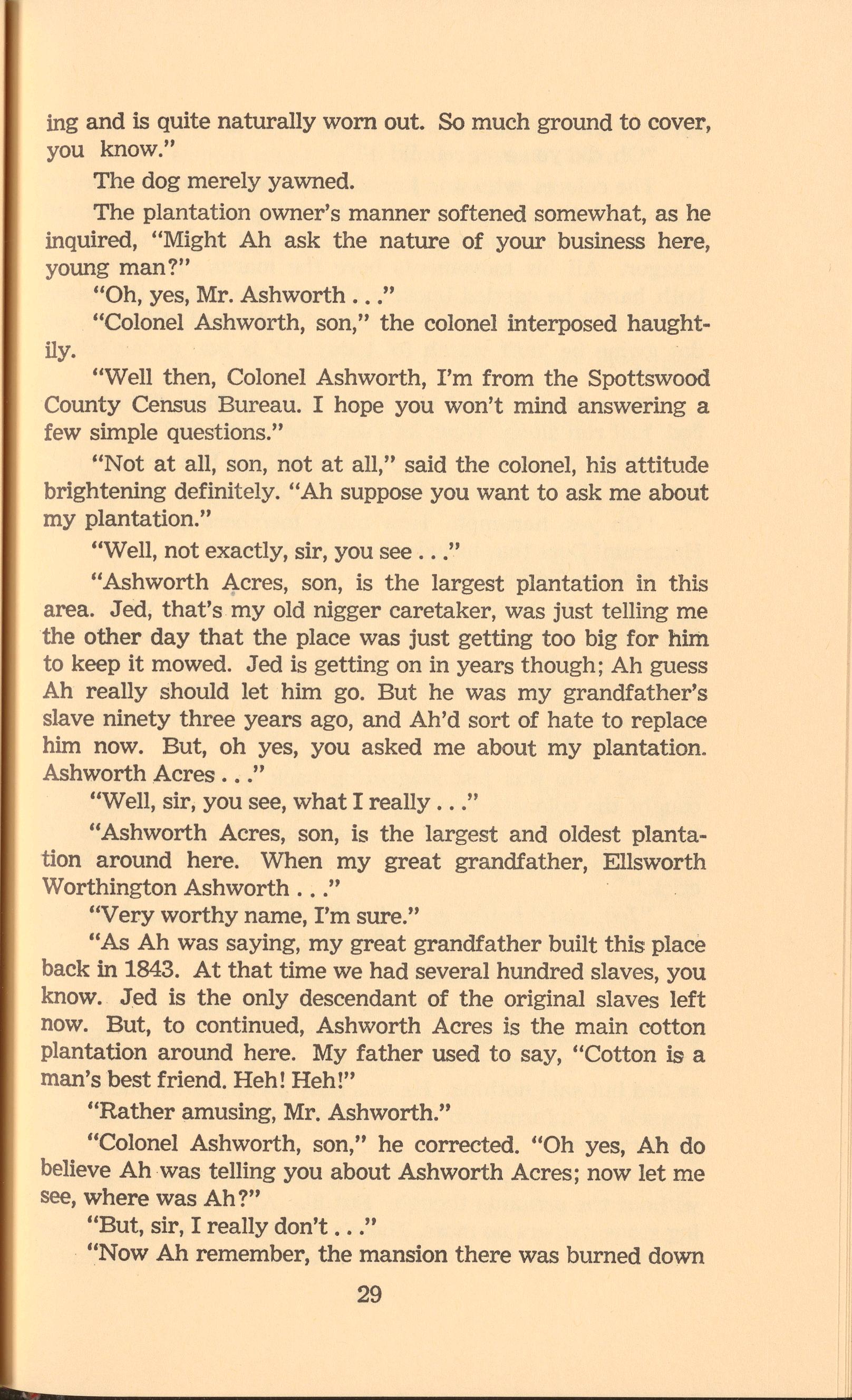
ing and is quite naturally worn out. So much ground to cover, you know."
The dog merely yawned.
The plantation owner's manner softened somewhat, as he inquired, "Might Ah ask the nature of your business here, young man?"
"Oh, yes, Mr. Ashworth ... "
"Colonel Ashworth, son," the colonel interposed haught-
"Well then, Colonel Ashworth, I'm from the Spottswood County Census Bureau. I hope you won't mind answering a few simple questions."
"Not at all, son, not at all," said the colonel, his attitude brightening definitely. "Ah suppose you want to ask me about my plantation."
"Well, not exactly, sir, you see ... "
"Ashworth Acres, son, is the largest plantation in this area. Jed, that's my old nigger caretaker, was just telling me the other day that the place was just getting too big for him to keep it mowed. Jed is getting on in years though; Ah guess Ah really should let him go. But he was my grandfather's slave ninety three years ago, and Ah'd sort of hate to replace him now. But, oh yes, you asked me about my plantation. Ashworth Acres ... "
"Well, sir, you see, what I really ... "
"Ashworth Acres, son, is the largest and oldest plantation around here. When my great grandfather, Ellsworth Worthington Ashworth ... "
"Very worthy name, I'm sure."
"As Ah was saying, my great grandfather built this place back in 1843. At that time we had several hundred slaves, you know. Jed is the only descendant of the original slaves left now. But, to continued, Ashworth Acres is the main cotton plantation around here. My father used to say, "Cotton is a man's best friend. Heh! Heh!"
"Rather amusing, Mr. Ashworth."
"Colonel Ashworth, son," he corrected. "Oh yes, Ah do believe Ah was telling you about Ashworth Acres; now let me see, where was Ah?"
"But, sir, I really don't ... "
"Now Ah remember, the mansion there was burned down
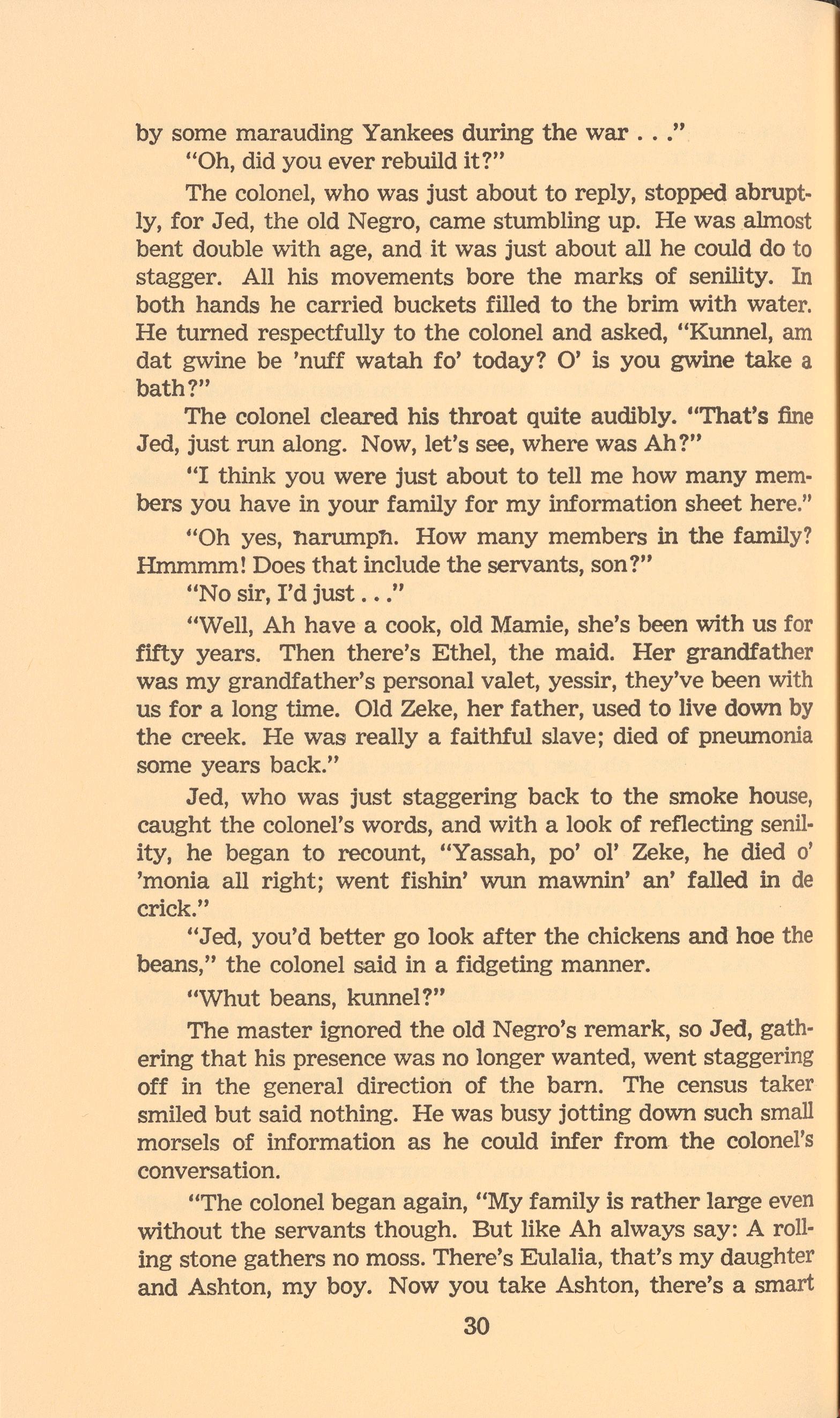
by some marauding Yankees during the war ... "
"Oh, did you ever rebuild it?"
The colonel, who was just about to reply, stopped abru ptly, for Jed, the old Negro, came stumbling up. He was almo st bent double with age, and it was just about all he could do to stagger. All his movements bore the marks of senility. In both hands he carried buckets filled to the brim with wat er. He turned respectfully to the colonel and asked, "Kunnel, am dat gwine be 'nuff watah fo' today? O' is you gwine take a bath?"
The colonel cleared his throat quite audibly. "That's fine Jed, just run along. Now, let's see, where was Ah?"
"I think you were just about to tell me how many me mbers you have in your family for my information sheet her e."
"Oh yes, llarumpll . How many members in the famil y? Hmmmm! Does that include the servants, son?"
"No sir, I'd just . • ."
"Well, Ah have a cook, old Mamie, she's been with us f or fifty years. Then there's Ethel, the maid. Her grandfath er was my grandfather's personal valet, yessir, they've been with us for a long time. Old Zeke, her father, used to live down by the creek. He was really a faithful slave; died of pneumo nia some years back."
Jed, who was just staggering back to the smoke hou se, caught the colonel's words, and with a look of reflecting senility, he began to recount, "Yassah, po' ol' Zeke, he died o' 'monia all right; went fishin' wun mawnin' an' falled in de crick."
"Jed, you'd better go look after the chickens and hoe t he beans," the colonel said in a fidgeting manner.
"Whut beans, kunnel ?"
The master ignored the old Negro's remark, so Jed, ga thering that his presence was no longer wanted, went stagger ing off in the general direction of the barn. The census tak er smiled but said nothing. He was busy jotting down such small morsels of information as he could infer from the colonel's conversation.
"The colonel began again, "My family is rather large even without the servants though. But like Ah always say: A ro lling stone gathers no moss. There's Eulalia, that's my daught er and Ashton, my boy. Now you take Ashton, there's a smart
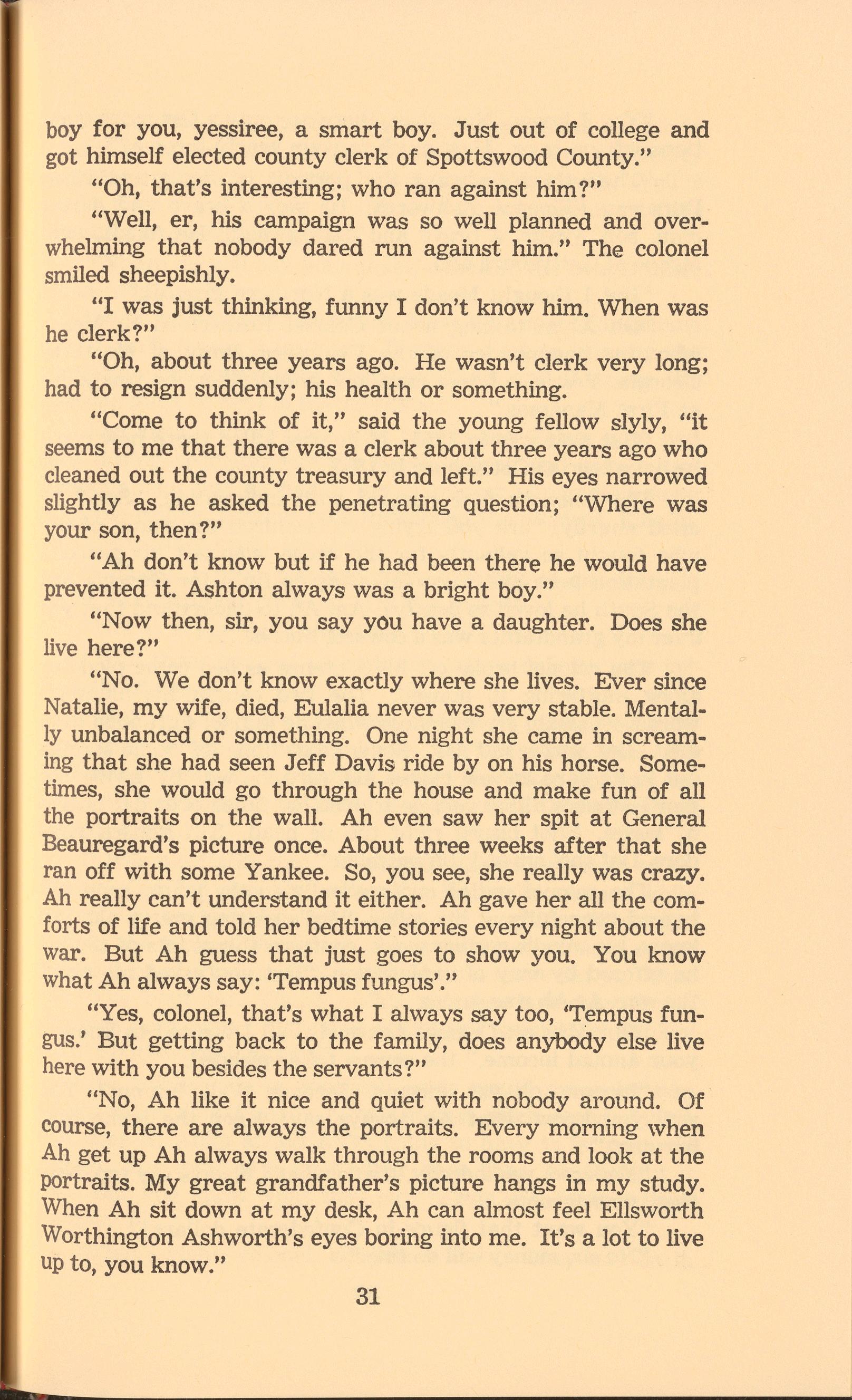
boy for you, yessiree, a smart boy. Just out of college and got himself elected county clerk of Spottswood County."
"Oh, that's interesting; who ran against him?"
"Well, er, his campaign was so well planned and overwhelming that nobody dared run against him." The colonel smiled sheepishly.
"I was just thinking, funny I don't know him. When was he clerk?"
"Oh, about three years ago. He wasn't clerk very long; had to resign suddenly; his health or something.
"Come to think of it," said the young fellow slyly, "it seems to me that there was a clerk about three years ago who cleaned out the county treasury and left." His eyes narrowed slightly as he asked the penetrating question; "Where was your son, then?"
"Ah don't know but if he had been there he would have prevented it. Ashton always was a bright boy."
"Now then, sir, you say you have a daughter. Does she live here?"
"No. We don't know exactly where she lives. Ever since Natalie, my wife, died, Eulalia never was very stable. Mentally unbalanced or something. One night she came in screaming that she had seen Jeff Davis ride by on his horse. Sometimes, she would go through the house and make fun of all the portraits on the wall. Ah even saw her spit at General Beauregard's picture once. About three weeks after that she ran off with some Yankee. So, you see, she really was crazy. Ah really can't understand it either. Ah gave her all the comforts of life and told her bedtime stories every night about the war. But Ah guess that just goes to show you. You know what Ah always say: 'Tempus fungus'."
"Yes, colonel, that's what I always say too, 'Tempus fungus.' But getting back to the family, does anybody else live here with you besides the servants?"
"No, Ah like it nice and quiet with nobody around. Of course, there are always the portraits. Every morning when Ah get up Ah always walk through the rooms and look at the portraits. My great grandfather's picture hangs in my study. When Ah sit down at my desk, Ah can almost feel Ellsworth Worthington Ashworth's eyes boring into me. It's a lot to live up to, you know."
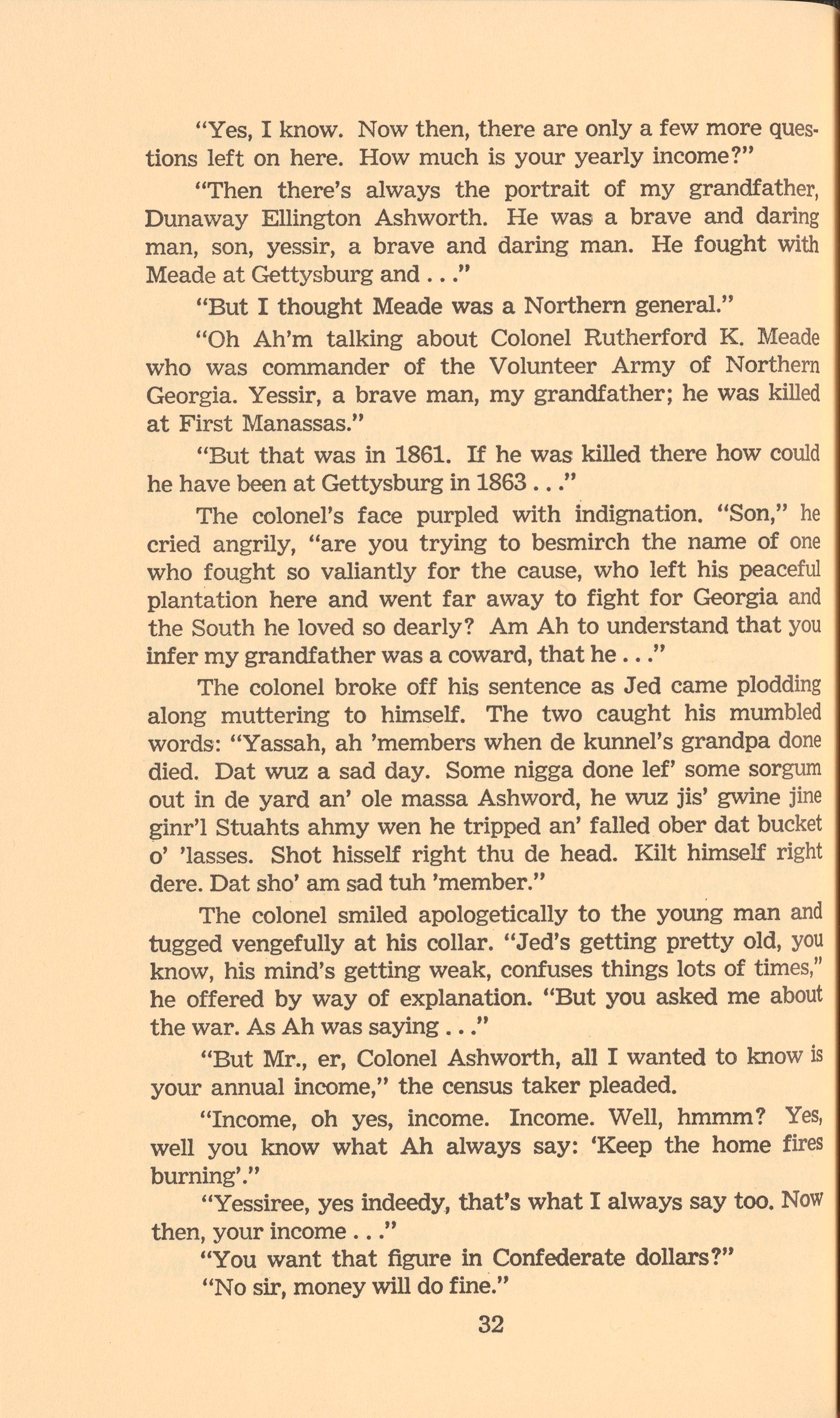
"Yes, I know. Now then, there are only a few more questions left on here. How much is your yearly income?"
"Then there's always the portrait of my grandfather, Dunaway Ellington Ashworth. He was a brave and daring man, son, yessir, a brave and daring man. He fought with Meade at Gettysburg and ... "
"But I thought Meade was a Northern general."
"Oh Ah'm talking about Colonel Rutherford K. Meade who was commander of the Volunteer Army of Northern Georgia. Yessir, a brave man, my grandfather; he was killed at First Manassas."
"But that was in 1861. If he was killed there how could he have been at Gettysburg in 1863 ... "
The colonel's face purpled with indignation. "Son," he cried angrily, "are you trying to besmirch the name of one who fought so valiantly for the cause, who left his peaceful plantation here and went far away to fight for Georgia and the South he loved so dearly? Am Ah to understand that you infer my grandfather was a coward, that he ... "
The colonel broke off his sentence as Jed came plodding along muttering to himself. The two caught his mumbled words: "Yassah, ah 'members when de kunnel's grandpa done died. Dat wuz a sad day. Some nigga done lef' some sorgum out in de yard an' ole massa Ashword, he wuz jis' gwine jine ginr'l Stuahts ahmy wen he tripped an' falled ober dat bucket o' 'lasses. Shot hisself right thu de head. Kilt himself right dere. Dat sho' am sad tuh 'member."
The colonel smiled apologetically to the young man and tugged vengefully at his collar. "Jed's getting pretty old, you know, his mind's getting weak, confuses things lots of times," he offered by way of explanation. "But you asked me about the war. As Ah was saying ... "
"But Mr., er, Colonel Ashworth, all I wanted to know is your annual income," the census taker pleaded.
"Income, oh yes, income. Income. Well, hmmm? Yes, well you know what Ah always say: 'Keep the home fires burning'."
"Yessiree, yes indeedy~ that's what I always say too. Now then, your income ... "
"You want that figure in Confederate dollars?"
"No sir, money will do fine."
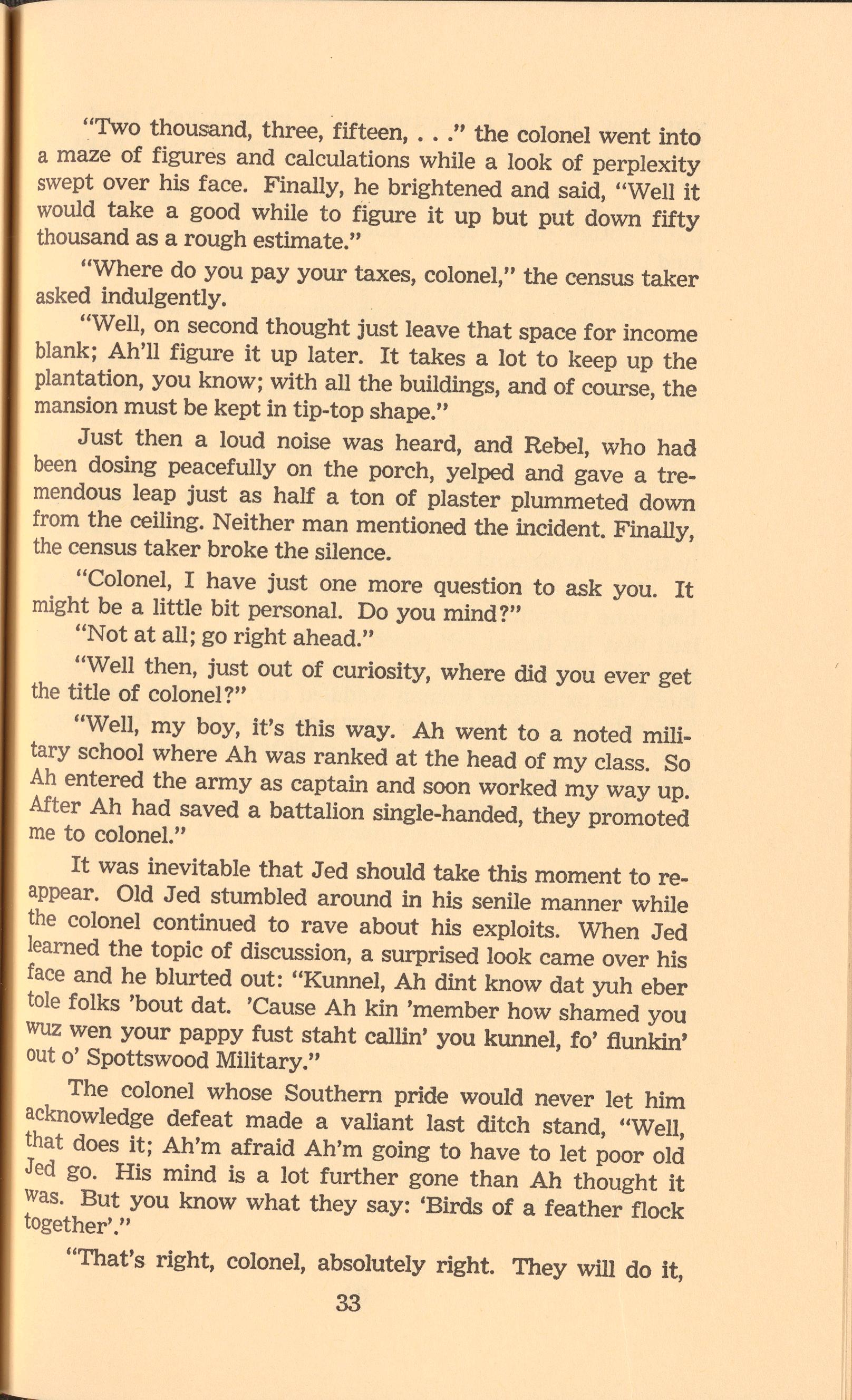
"Two thousand, three, fifteen, •.. " the colonel went into a maze of figures and calculations while a look of perplexity swept over his face. Finally, he brightened and said, "Well it would take a good while to figure it up but put down fifty thousand as a rough estimate."
"Where do you pay your taxes, colonel," the census taker asked indulgently.
"Well, on second thought just leave that space for income blank; Ah'll figure it up later. It takes a lot to keep up the plantation, you know; with all the buildings, and of course, the mansion must be kept in tip-top shape."
Just then a loud noise was heard, and Rebel, who had been dosing peacefully on the porch, yelped and gave a tre- mendous leap just as half a ton of plaster plummeted down from the ceiling. Neither man mentioned the incident. Finally, the census taker broke the silence.
"Colonel, I have just one more question to ask you. It might be a little bit personal. Do you mind?"
"Not at all; go right ahead."
"Well then, just out of curiosity, where did you ever get the title of colonel?"
"Well, my boy, it's this way. Ah went to a noted mili- tary school where Ah was ranked at the head of my class. So Ah entered the army as captain and soon worked my way up. After Ah had saved a battalion single-handed, they promoted me to colonel."
It was inevitable that Jed should take this moment to reappear. Old Jed stumbled around in his senile manner while the colonel continued to rave about his exploits. When Jed learned the topic of discussion, a surprised look came over his face and he blurted out: "Kunnel, Ah dint know dat yuh eber tole folks 'bout dat. 'Cause Ah kin 'member how shamed you wuzwen your pappy fust staht callin' you kunnel, fo' flunkin' out o' Spottswood Military."
The colonel whose Southern pride would never let him acknowledge defeat made a valiant last ditch stand, "Well, that does it; Ah'm afraid Ah'm going to have to let poor old Jed go. His mind is a lot further gone than Ah thought it was. But you know what they say: 'Birds of a feather flock together'."
"That's right, colonel, absolutely right. They will do it, 33
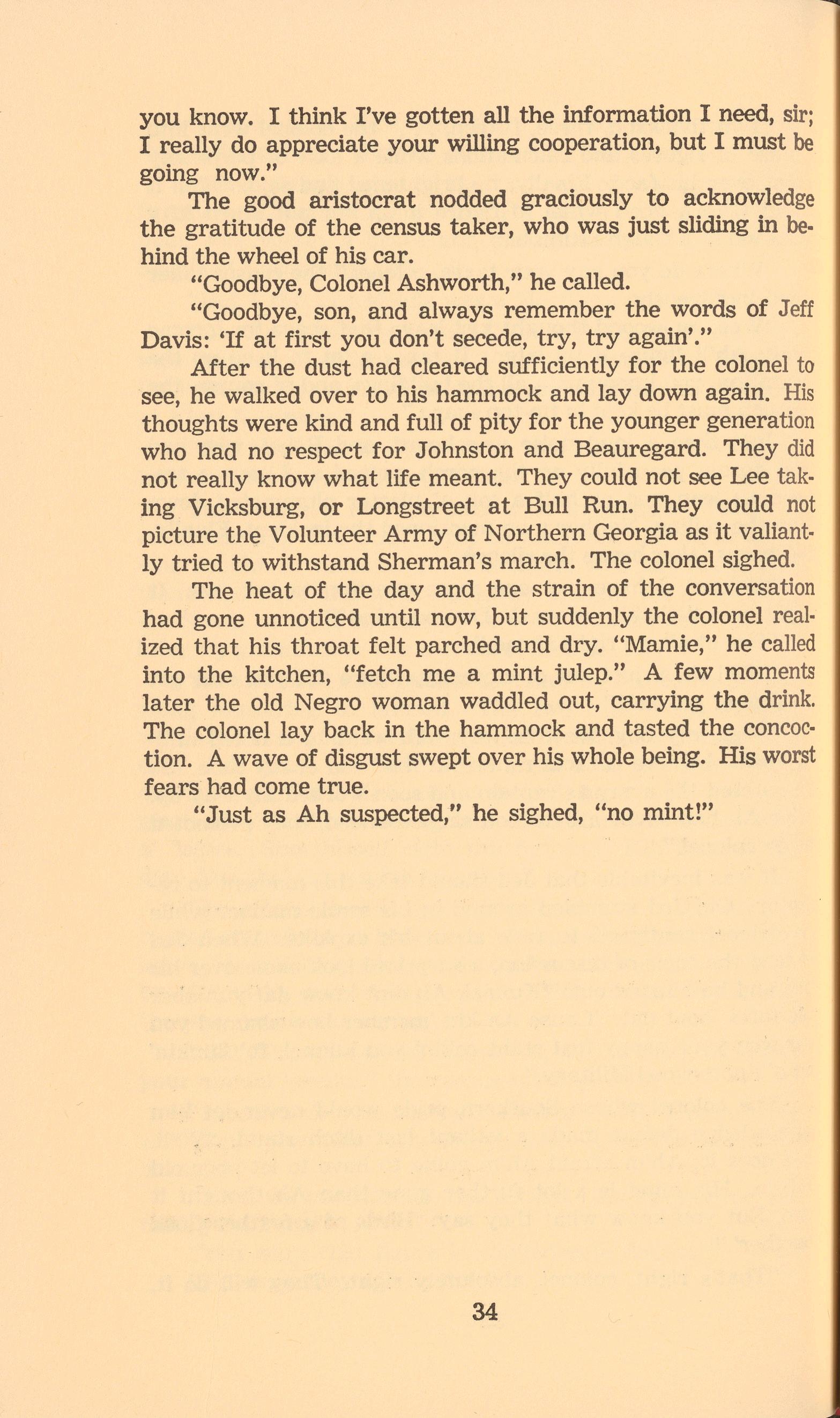
you know. I think I've gotten all the information I need, sir; I really do appreciate your willing cooperation, but I must be going now."
The good aristocrat nodded graciously to acknowle dge the gratitude of the census taker, who was just sliding in behind the wheel of his car.
"Goodbye, Colonel Ashworth," he called.
"Goodbye, son, and always remember the words of Jeff Davis: 'If at first you don't secede, try, try again'."
After the dust had cleared sufficiently for the colonel t o see, he walked over to his hammock and lay down again. His thoughts were kind and full of pity for the younger genera tion who had no respect for Johnston and Beauregard. They did not really know what life meant. They could not see Lee taking Vicksburg, or Longstreet at Bull Run. They could not picture the Volunteer Army of Northern Georgia as it vali antly tried to withstand Sherman's march. The colonel sighed .
The heat of the day and the strain of the conversa tion had gone unnoticed until now, but suddenly the colonel r ealized that his throat felt parched and dry. "Mamie," he called into the kitchen, "fetch me a mint julep." A few mom ents later the old Negro woman waddled out, carrying the d rink. The colonel lay back in the hammock and tasted the concoction. A wave of disgust swept over his whole being. His worst fears had come true.
"Just as Ah suspected," he sighed, "no mint!"
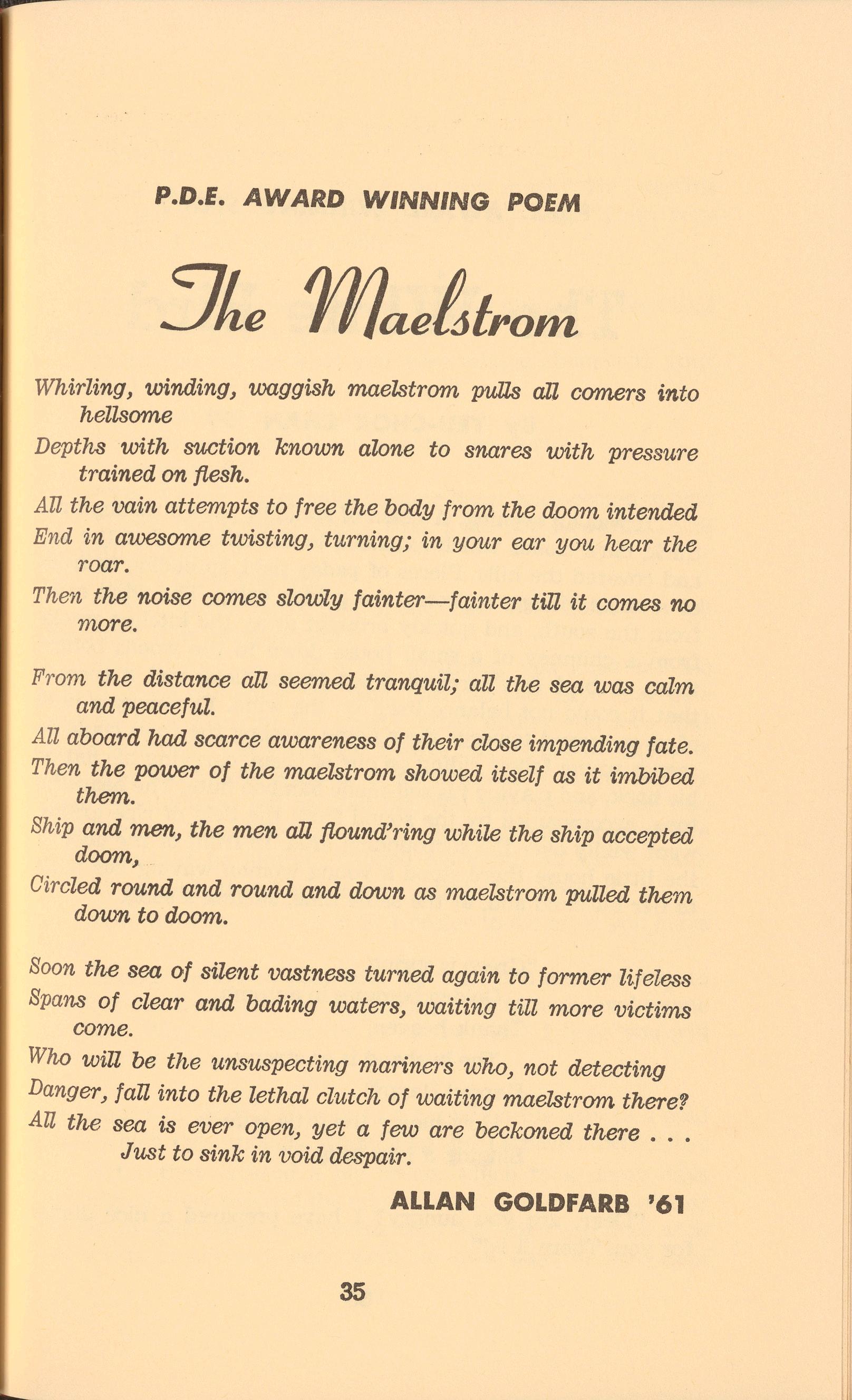
Whirling, winding, waggish mae"lstrom pulls all earners into hel"lsome
Depths with suction known alone to snares with pressure trained on flesh.
All the vain attempts to free the body from the doom intended End in awesome twisting, turning; in your ear you hear the roar.
Then the noise comes slowly fainter-! ainter till it cames no more.
F'rom the distance all seemed tranquil,· all the sea was calm and peaceful.
All aboard had scarce awareness of their close impending fate.
Then the power of the mae"lstrom showed itself as it imbibed them.
Ship and men, the men all fi,ound'ring while the ship accepted doom,
Circled round and round and down as mae"lstrom pulled them down to doom.
Soon the sea of silent vastness turned again to former lifeless Spans of clear and bading waters, waiting till more victims come.
Who will be the unsuspecting mariners who, not detecting Danger, fall into the lethal clutch of waiting mae"lstrom there?
All the sea is ever open, yet a few are beckoned there •.. Just to sink in void despair.
ALLAN GOLDFARB '61

By YEU-CHOR CHAN '59
It was an evening. A beam of sunlight passed through the thick, dark clouds which extended to the other end of the sky and covered the hills. Pieces of paddy field, spreading in f ront of a small village, reflected the golden color. The wind came from the south, and quickly brought away the kitchen sm oke from a chimney of a small house down to the woods be hind them. A bird flew straight · down to the field, and it see med that it could not balance itself on the wind. Far away a h erd of cows moved towards their home. Among the cows coul d be seen a young fellow riding on on e of them, carrying his ha t on his back, and playing his self-made bamboo flute. The beau tiful tone, accompanied by the sound from the field of . ripe gr ains, went wildly over the surrounding area. In front of the door of the little house there stood a young woman waving her h and to her husband and, at the same time, singing a song.
"Green is spring, Golden becomes in autumn. Thank heaven,
The husband is so strong. Happy! Happy!
How happy the little wife is Singing a love song."
"Dear, are you hungry? I have prepared a nice dinner for you. There it is!"
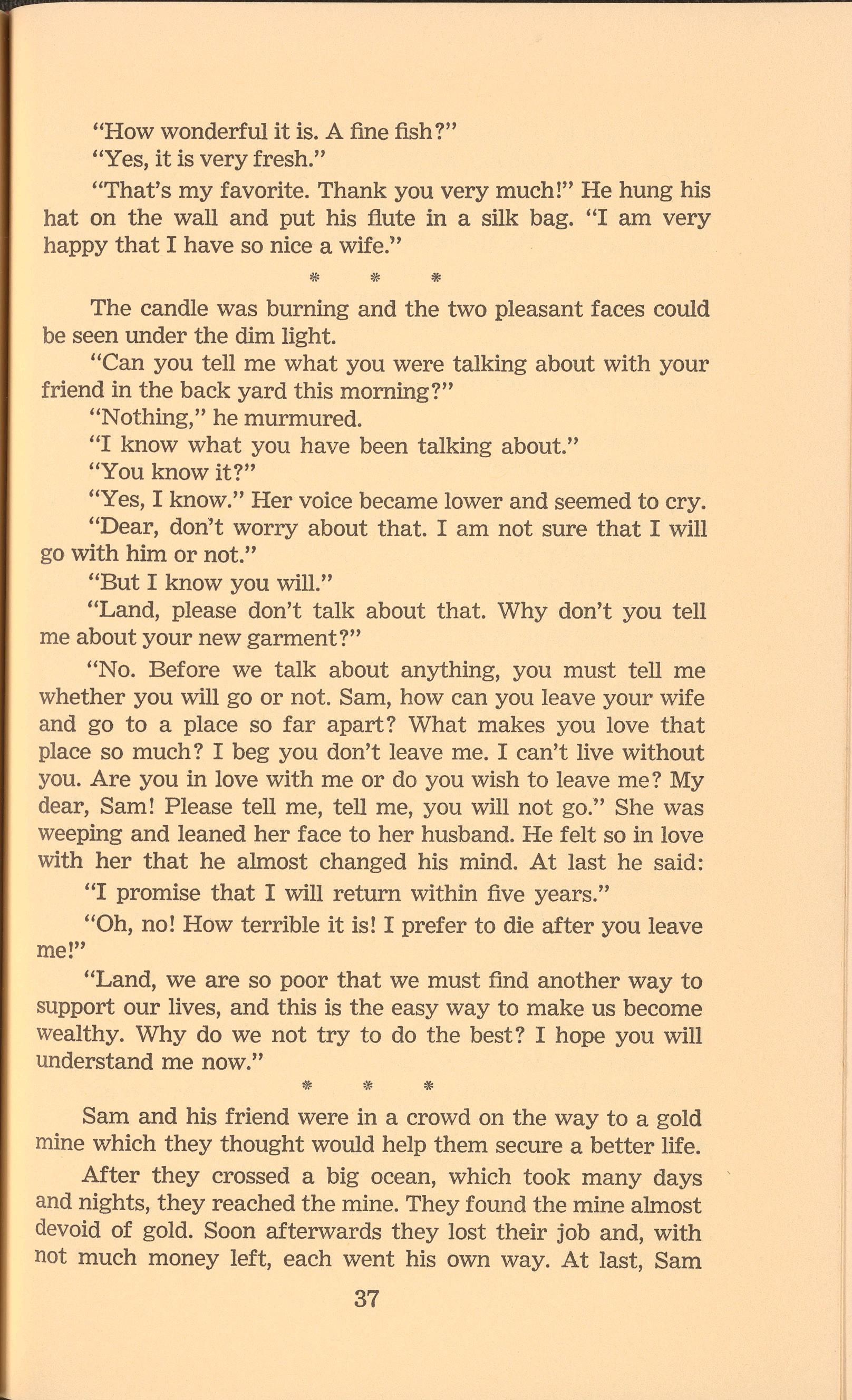
"How wonderful it is. A fine fish?"
"Yes, it is very fresh."
"That's my favorite. Thank you very much!" He hung his hat on the wall and put his flute in a silk bag. "I am very happy that I have so nice a wife."
The candle was burning and the two pleasant faces could be seen under the dim light.
"Can you tell me what you were talking about with your friend in the back yard this morning?"
"Nothing," he murmured.
"I know what you have been talking about."
"You know it?"
"Yes, I know." Her voice became lower and seemed to cry.
"Dear, don't worry about that. I am not sure that I will go with him or not."
"But I know you will."
"Land, please don't talk about that. Why don't you tell me about your new garment?"
"No. Before we talk about anything, you must tell me whether you will go or not. Sam, how can you leave your wife and go to a place so far apart? What makes you love that place so much? I beg you don't leave me. I can't live without you. Are you in love with me or do you wish to leave me? My dear, Sam! Please tell me, tell me, you will not go." She was weeping and leaned her face to her husband. He felt so in love with her that he almost changed his mind. At last he said:
"I promise that I will return within five years."
"Oh, no! How terrible it is! I prefer to die after you leave me!"
"Land, we are so poor that we must find another way to support our lives, and this is the easy way to make us become wealthy. Why do we not try to do the best? I hope you will understand me now."
Sam and his friend were in a crowd on the way to a gold mine which they thought would help them secure a better life.
After they crossed a big ocean, which took many days and nights, they reached the mine. They found the mine almost devoid of gold. Soon afterwards they lost their job and, with not much money left, each went his own way. At last, Sam
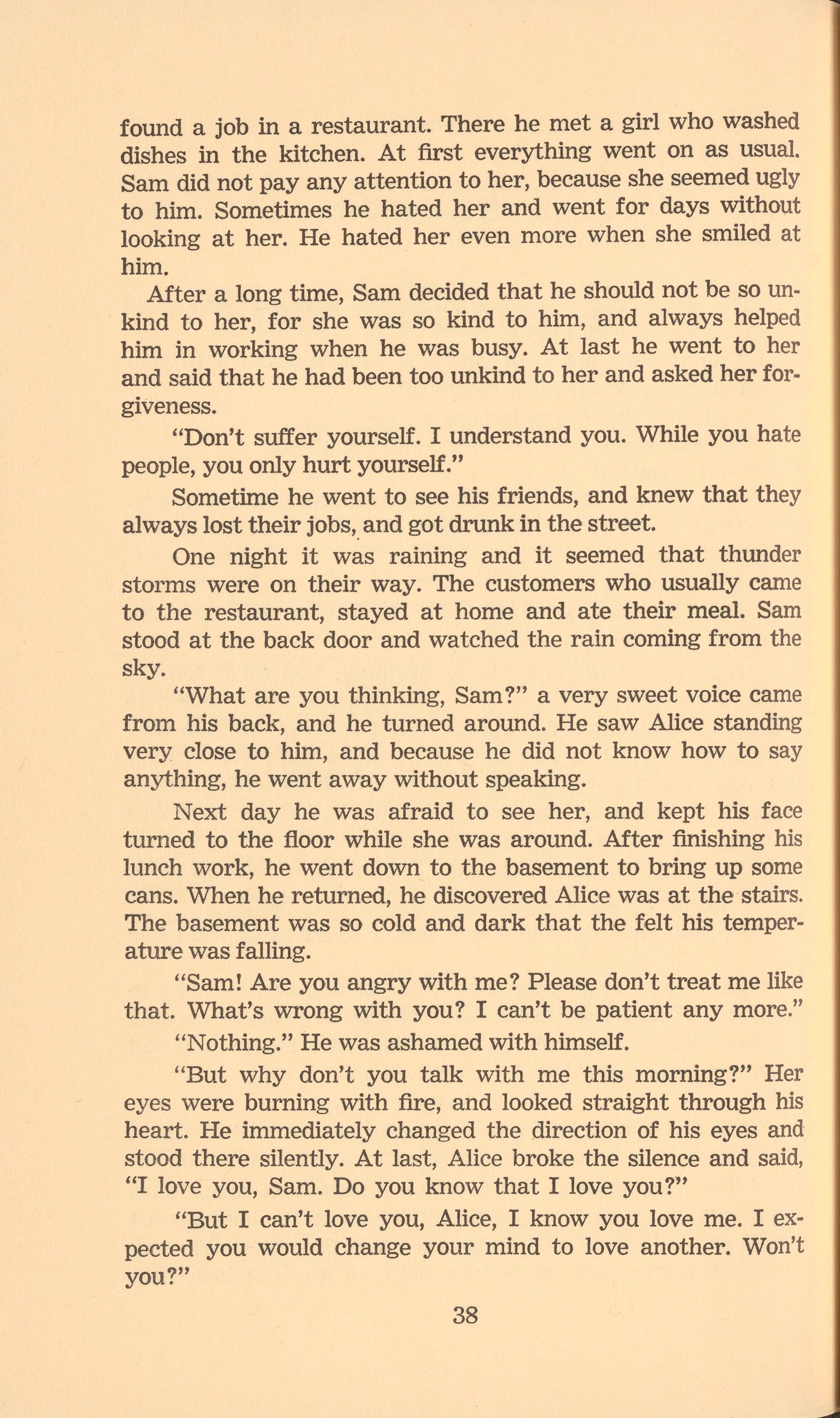
found a job in a restaurant. There he met a girl who washed dishes in the kitchen. At first everything went on as usual. Sam did not pay any attention to her, because she seemed ugly to him. Sometimes he hated her and went for days without looking at her. He hated her even more when she smiled at him.
After a long time, Sam decided that he should not be so unkind to her, for she was so kind to him, and always helped him in working when he was busy. At last he went to her and said that he had been too unkind to her and asked her forgiveness.
"Don't suffer yourself. I understand you. While you hate people, you only hurt yourself."
Sometime he went to see his friends, and knew that they always lost their jobs,_and got drunk in the street.
One night it was raining and it seemed that thunder storms were on their way. The customers who usually came to the restaurant, stayed at home and ate their meal. Sam stood at the back door and watched the rain coming from the sky.
"What are you thinking, Sam?" a very sweet voice came from his back, and he turned around. He saw Alice standing very close to him, and because he did not know how to say anything, he went away without speaking.
Next day he was afraid to see her, and kept his face turned to the floor while she was around. After finishing his lunch work, he went down to the basement to bring up some cans. When he returned, he discovered Alice was at the stairs. The basement was so cold and dark that the felt his temperature was falling.
"Sam! Are you angry with me? Please don't treat me like that. What's wrong with you? I can't be patient any more."
"Nothing." He was ashamed with himself.
"But why don't you talk with me this morning?" Her eyes were burning with fire, and looked straight through his heart. He immediately changed the direction of his eyes and stood there silently. At last, Alice broke the silence and said, "I love you, Sam. Do you know that I love you?"
"But I can't love you, Alice, I know you love me. I expected you would change your mind to love another. Won't you?"

"No, I have loved only you since the first time I saw you. If you love me I will marry you, Sam. Do you love me? I think y ou still hate me, don't you?"
"No, no! You are so kind to me and I no longer hate you an d I find that I am also in love with you."
" But why did you say you can't love me?"
"-----" Sam wanted to tell her that he had been m arried, but something seemed stuck in his throat, and the words would not come. At last he put down those cans and held her hand and kissed it lightly, for he found she was beautiful to him in that moment.
Several years later, Sam built a very nice home in a countr y near a beach. One evening he went out with his pretty, little daughter to the beach. The air was so fresh and the water was so nice that Sam and his daughter felt as if they had fallen ba ck into nature. They stood on a big rock and let their eyes ro am the far distance at the sea level line. The ocean under th e sunset looked like a piece of melted gold covering the surfa ce of the earth. The waves continuously stroked upon those r ocks beyond the beach on the other side. On e by one they ra ised many white sprays up to the sky and spreaded themselves back into the sea.
"Look, daddy!" the little girl raised her little round hand, an d pointed out to the sea. A white bird was flying towards the west and slowly it vanished in the sunset. "I wish that the white bird could come back here, daddy, Don't you?"
Next morning when Alice woke up, her husband had disappeared. She found a note on the table:
I am flying in the sky across thousand miles of ocean. I am flying in the sky across thousands feet of mountain. Here is my home and there is my home.
Today stay in north Tomorrow stay in south I may not be back home again. *
It was a thunder evening. After a flash of lightning, a st rong thunder broke out in a paddy field. An old woman saw
a big white bird from Land's house flying over the hill to the sea. At last it lost its balance and fell into the sea.
"What a pity."
"She wants to see her husband now."
"How long has it been?"
"Nine years."
"She never heard about him, not even once."
"What a pity."
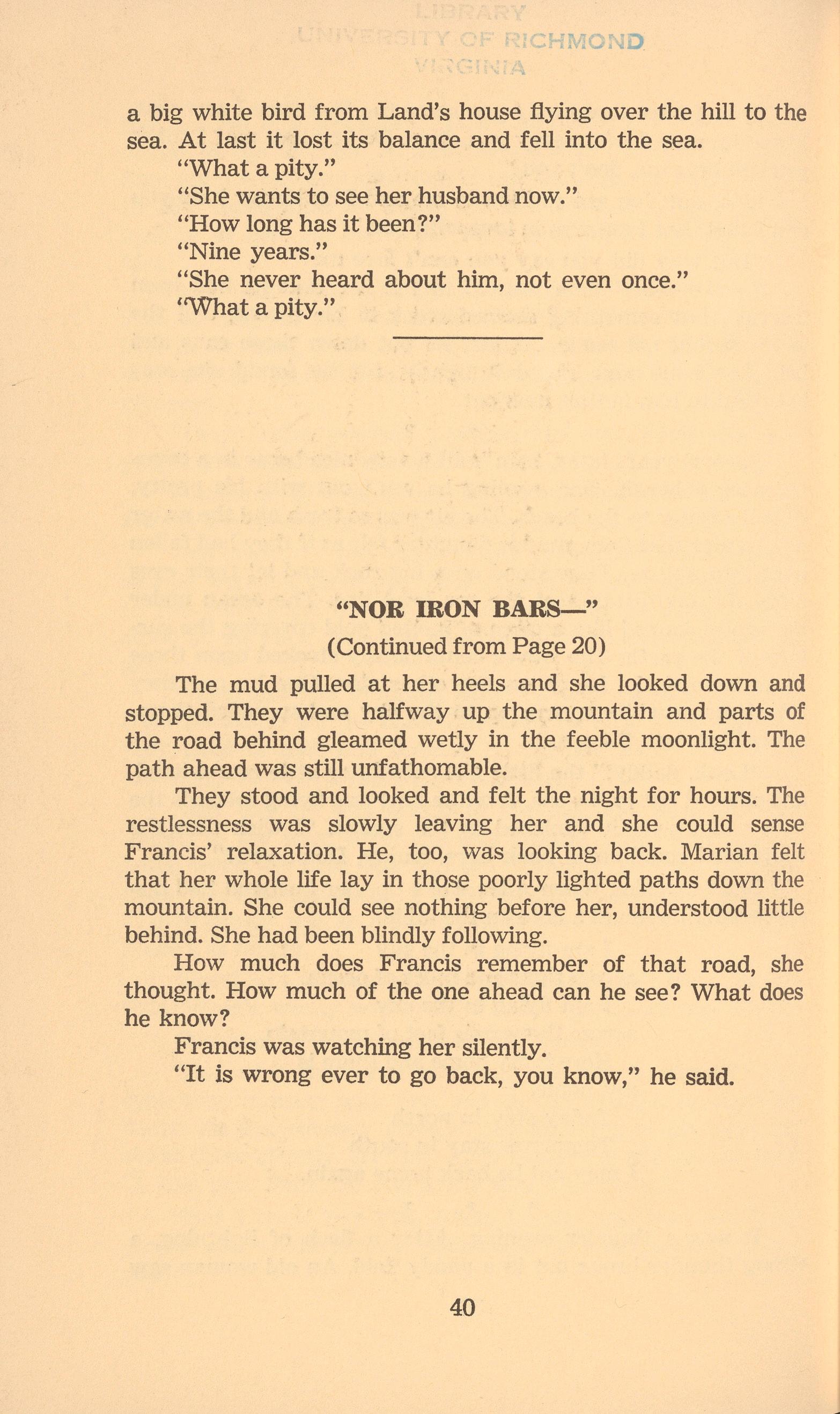
(Continued from Page 20)
The mud pulled at her heels and she looked down and stopped. They were halfway up the mountain and parts of the road behind gleamed wetly in the feeble moonlight. The path ahead was still unfathomable. They stood and looked and felt the night for hours. The restlessness was slowly leaving her and she could sense Francis' relaxation. He, too, was looking back. Marian felt that her whole life lay in those poorly lighted paths down the mountain. She could see nothing before her, understood little behind. She had been blindly following. How much does Francis remember of that road, she thought. How much of the one ahead can he see? What does he know?
Francis was watching her silently. "It is wrong ever to go back, you know,'' he said.